LEARN real ENGLISH LANGUAGE & CULTURE - LESSON 2
World's biggest, free non-profit English language and culture course


In Lesson 2 we learn vocabulary for jobs and employment (SP: empleo IT: impegno) .
We will explain step-by-step how to get through (SP: superar IT: superare) a job interview.
After we explain how to find a job or getting unemployment benefits (SP: cobrar el paro IT: indennità).
In this lesson there is also an English language video tutorial to explain How to say 'Go Away' in 10 fun ways.
Finally students will practice with communication activities, quizzes and games.

Photo of British culture: a Reliant robin three-wheel car from the 1970s.

Zak Washington, the corrupt English teacher, is too lazy to work at the language school, so he is taking his group of students to visit a ‘cultural’ place of interest. Today we are going to…..
THE DOLE OFFICE
(SP: oficina de paro IT: ufficio di collocamento)
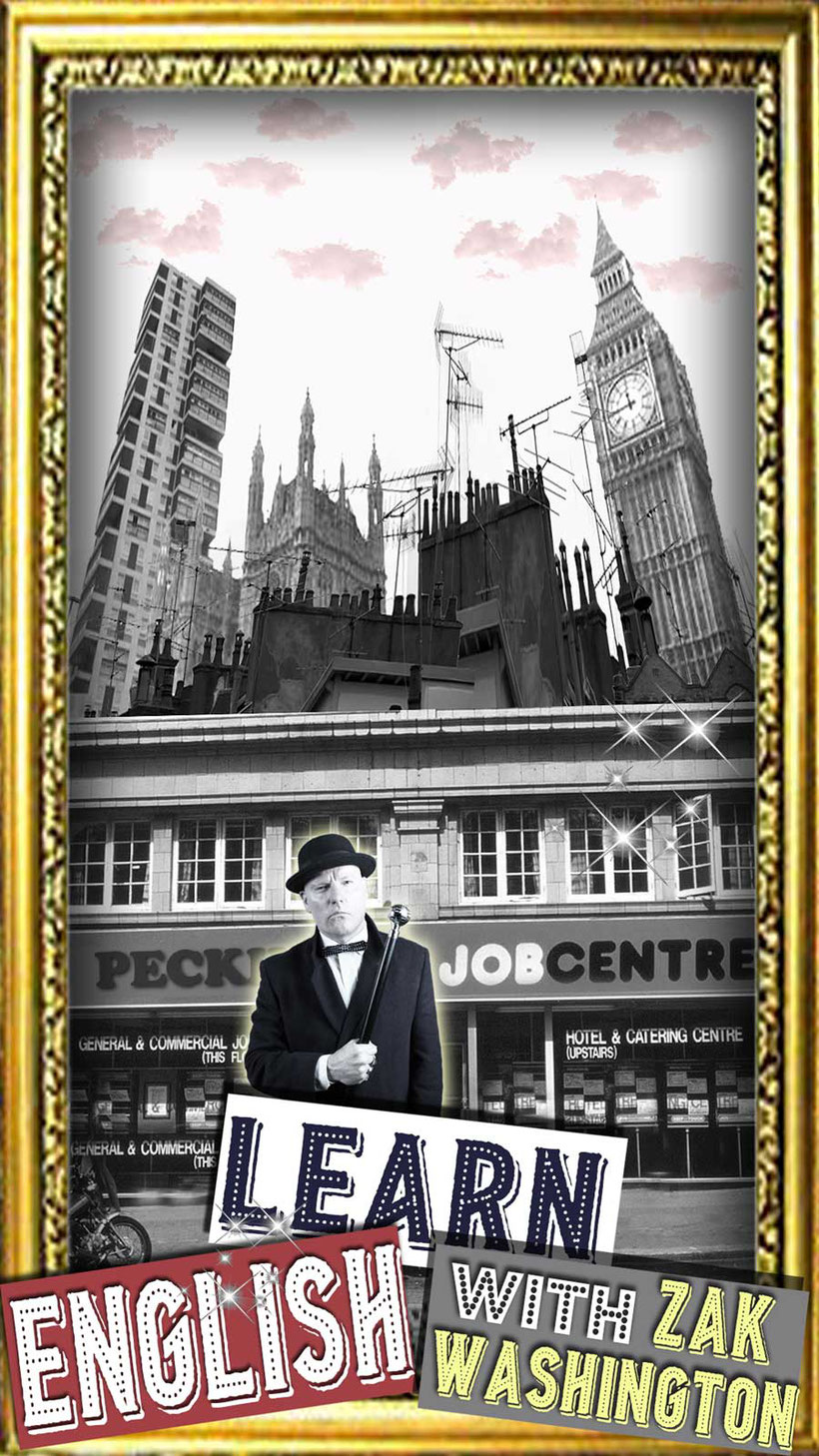
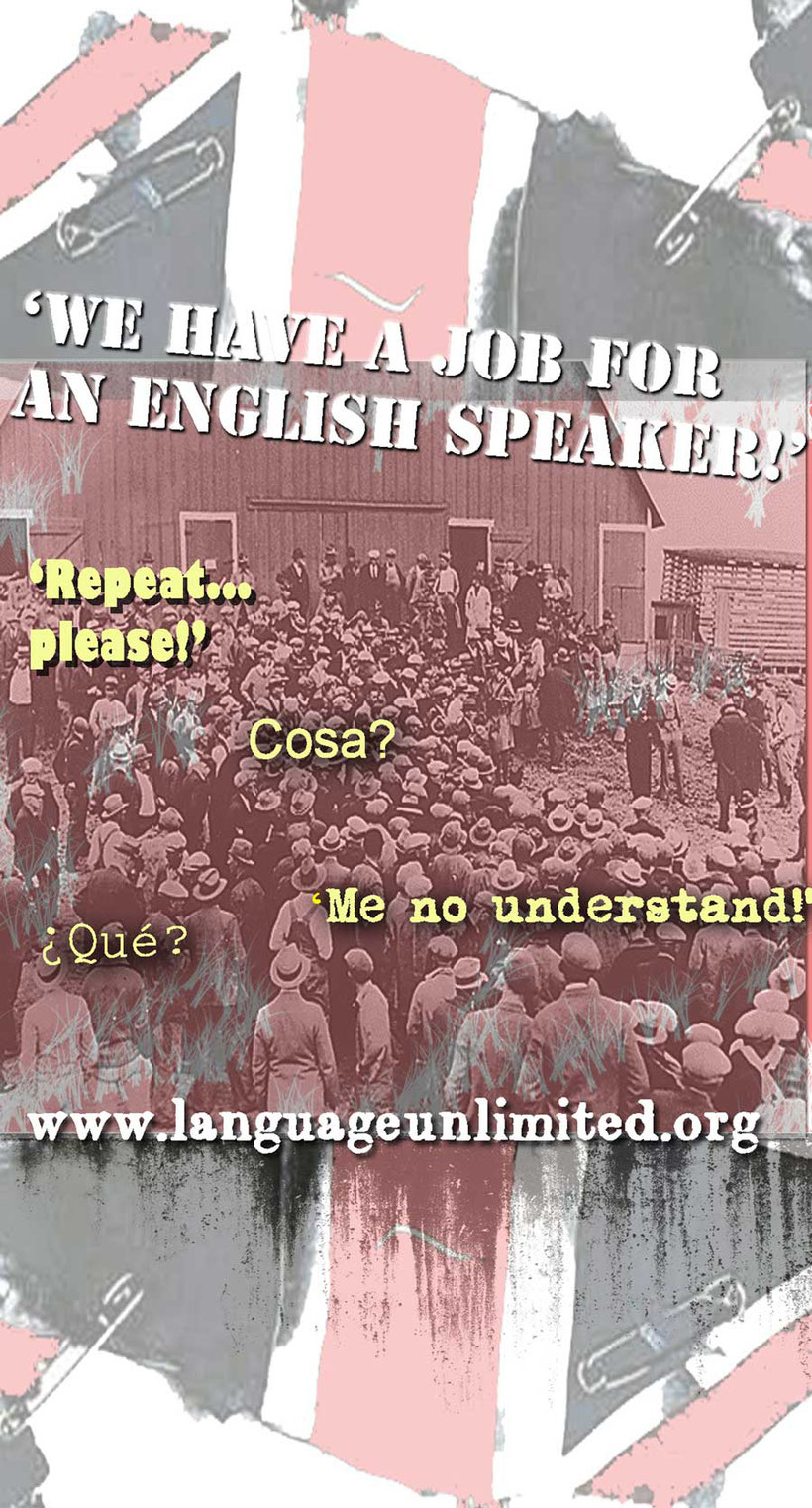
2.1 British Culture Vocabulary.
Brainstorm vocabulary of social security. (The student whose last pet had the most vowels in its name must come to the front of the class and draw a mind map on the board.) If you don’t know what a mind map is, ask your teacher. If (s)he doesn’t know, leave the class and go and find a dictionary. When you find the answer, finish the drawing on the board, then buy a drink for everybody in your class in the local pub.



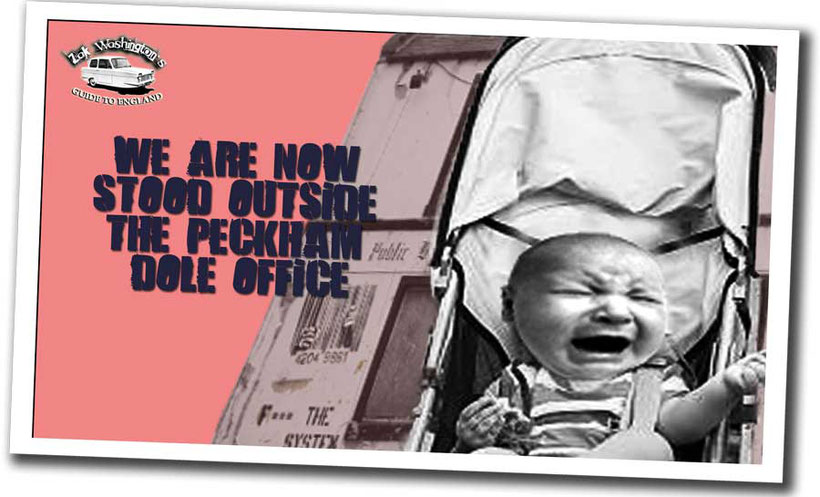
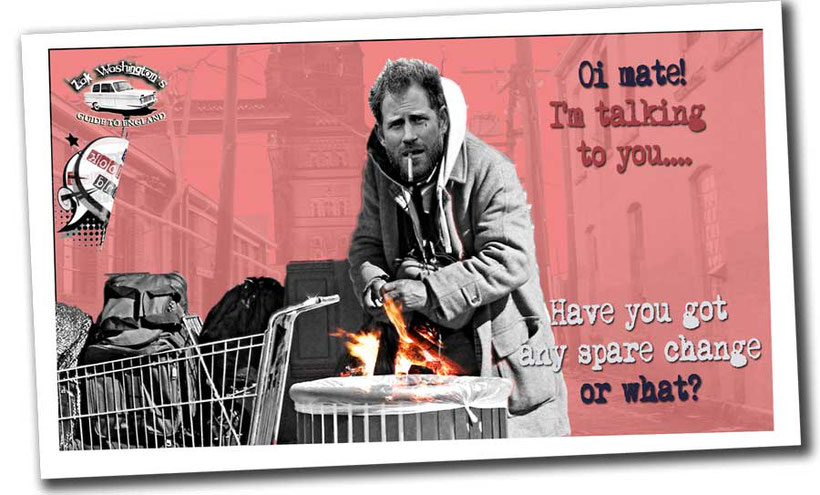


CHAPTER 2 SONG 1 - VISITING THE DOLE OFFICE
ZAK WASHINGTON: We are now stood outside the Peckham Dole[1] Office on a cold, wet, dark Tuesday morning, in one of the poorest, ugliest (SP: más feos IT: più brutti) and most violent areas (SP: zonas IT: zone) of Western Europe.
MAN IN THE STREET: You got any spare change[2] mate [3]?
ZAK WASHINGTON: How do you feel Giovanni?’
GIOVANNI: I would like to return to my native country. It’s extremely depressing here.
MAN IN THE STREET: Oi[4] mate! I’m talkin’ to you! Have you got any spare change or what?
ZAK WASHINGTON: Let’s take a look inside. What do you see Ahmet?
MAN IN THE STREET: I’m talking to you! You want a smack[5] in the mouth!
AHMET: I can't see anything. It's full of cigarette smoke! ......And old men... they are reading newspapers. There are very few chairs. Everything is fixed to the wall or floor. Ashtrays (SP: ceniceros IT: portaceneri), seats… Nothing is moveable. Nothing is throwable.
And at the end there is another counter protected by a huge unbreakable glass screen. It looks exactly like.... exactly like the betting shop that we were in yesterday! Hey! Aren’t they the same men that were in the betting shop too?
WOMAN: Are you gonna get a bleedin[6]’ move on love? This is a flippin [7]’ dole office. It ain’t a bloody[8] language school.
AHMET: I didn’t realise… I thought…Eh? Eh! What’s going on here? Teacher, can you explain a second? What’s happening?
ZAK WASHINGTON: Very observant. That’s how the system works. You turn up here. Sign on. Pick up your dole check. Cash it in at the post office, pop into the bookies and put it on a horse, and throw all of it away. Then you go home and face up to the wife and she tells you off.
ZAK WASHINGTON’S EX-WIFE: Oh, here he comes. Walzing in again as he pleases as if this was some kind of bloody hotel. Where have you been? You’ve been down putting all your money on the dogs this time, have you? What about the new school uniform that you promised to get this week? Do you think this is normal? Why can’t you do what the bloody Jones do? Throwing it all away and wasting our money…
GIOVANNI: This really is very depressing. If I ________ (to be) on the dole, I _______ ( to be) very sad.
ZAK WASHINGTON: Don’t worry, we ____________ (to be) here long, if we _________ (to hurry up). I only have to go to a quick appointment with the ‘Job Club’.
GIOVANNI: What’s the Job Club?
GLOSSARY & USAGE
[1] Dole (noun) (SP: el paro IT: assistenza) refers, in a more informal way, to the social security system, and also to the benefits received. The government building is the dole office. The state of unemployment is (to be on) the dole. In the US the concept is known as welfare.
[2] Spare change (noun) (SP: calderilla, limosna IT: spiccioli) ‘Spare’ means ‘extra’. ‘Change’ refers to coins and money. So, someone asking for ‘spare change’ wants you to give them any ‘extra’ money that you have which you don’t need.
[3] Mate (noun) (SP: colega, tronco, amico, IT: compagno, amico,) Friend, companion, buddy, etc. Very typical in Britain and Australia. Often linked to other words: classmate, housemate, workmate, soulmate, playmate, etc.
[4] Oi (exclamation) (SP: oye, IT: ehi, ohi.) This is a slang word you say (or shout) to get someone’s attention. It’s similar to ‘Hey’ but is more street language and is considered ruder.
[5] Smack (noun) (SP: golpe, tortazo IT: schiaffo) Many foreign students think that a ‘smack’ refers to a kiss because they have seen it in comics (for the sound someone makes when they kiss someone). It refers to a violent strike or hit. ‘Smack in the mouth’ means ‘a punch in the face’.
[6] Bleeding (adjective) (SP: maldito IT: dannato, maledetto) See below
[7] Flipping (adjective) (SP: maldito IT: dannato, maledetto) See below
[8] (adjective) ‘Bleeding’, ‘Flipping’ and ‘Bloody’ (adjective) (SP: maldito IT: dannato, maledetto) are very common light swearwords (SP ‘Palabrotas’ IT ‘Parolacce’) which have the same meaning as the more offensive word f*cking. (adjective) (SP: puto IT: cazzo di) Used to show that you are not happy, upset or annoyed about something. To use them correctly, put them before a noun: ‘Bloody weather’ ‘My bleeding boss…’
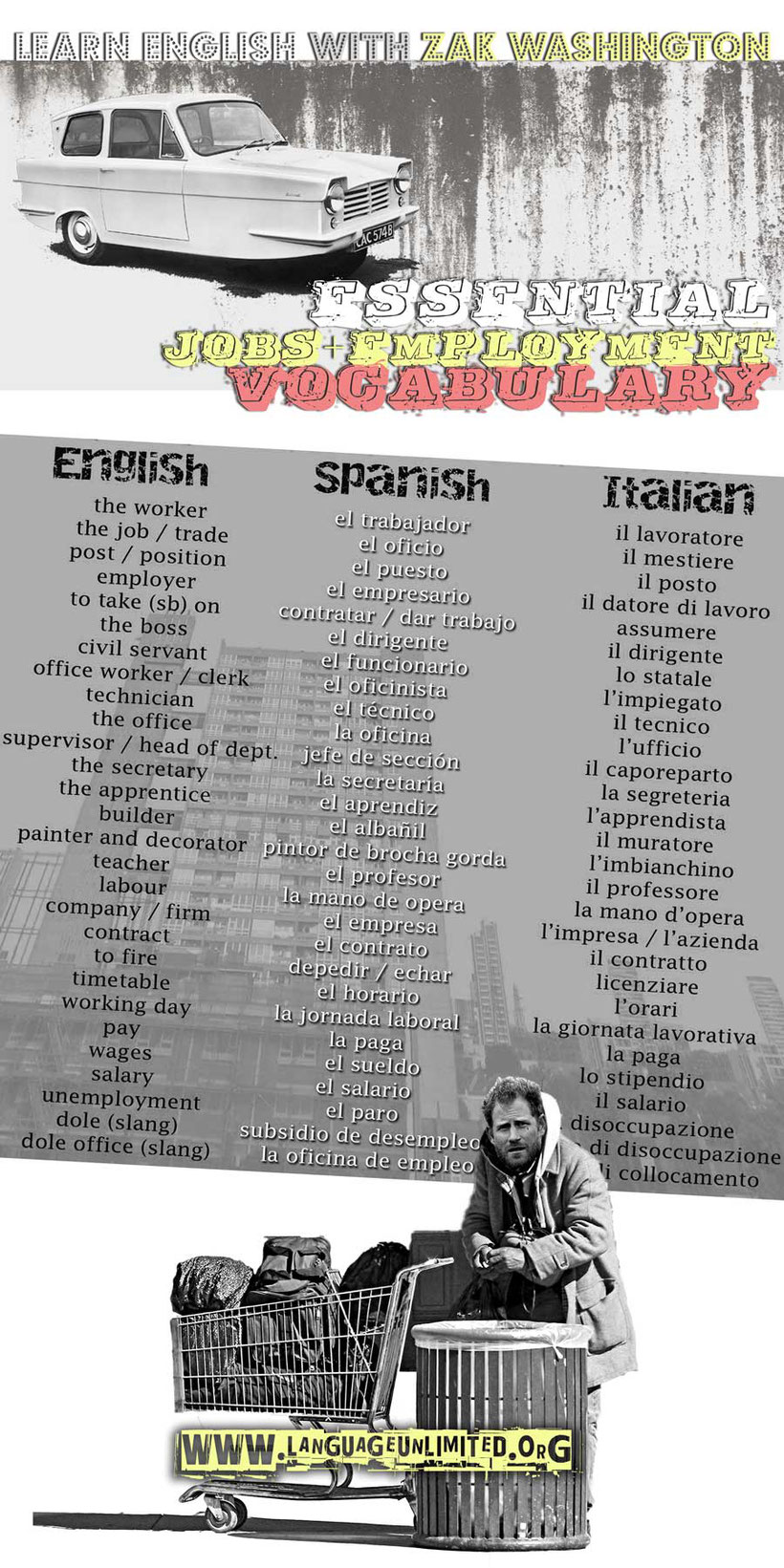
ZAKMAG Free English language learning magazine. CLICK here for a FREE copy of this month's ZAKMAG with all the corresponding exercises, explanations and fun activities.
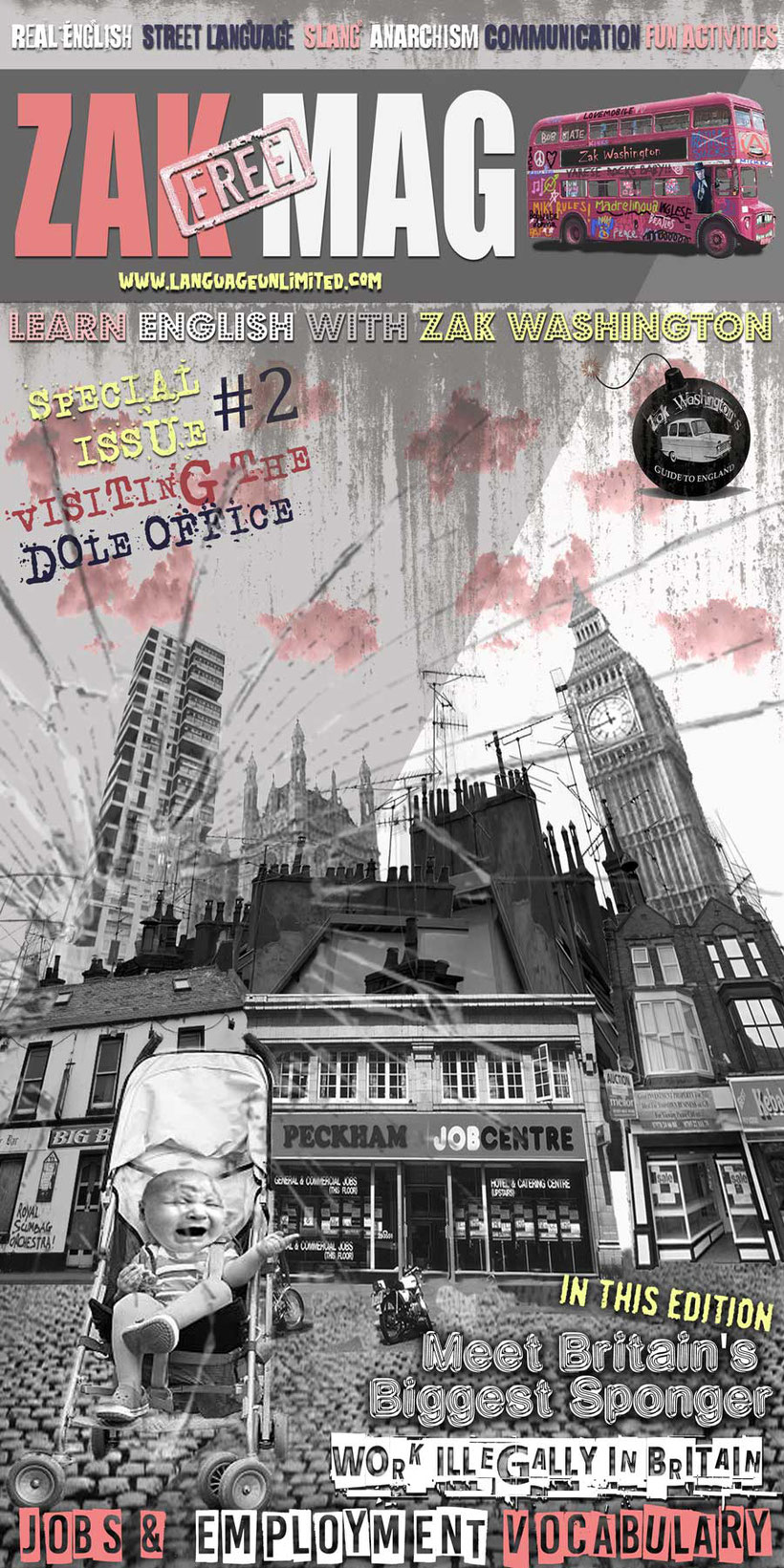
2.2 VOCABULARY Students explain the phrasal verbs in the above sentences and then make up sentences of their own. Are the phrasal verbs transitive or non-transitive? Are they separable?
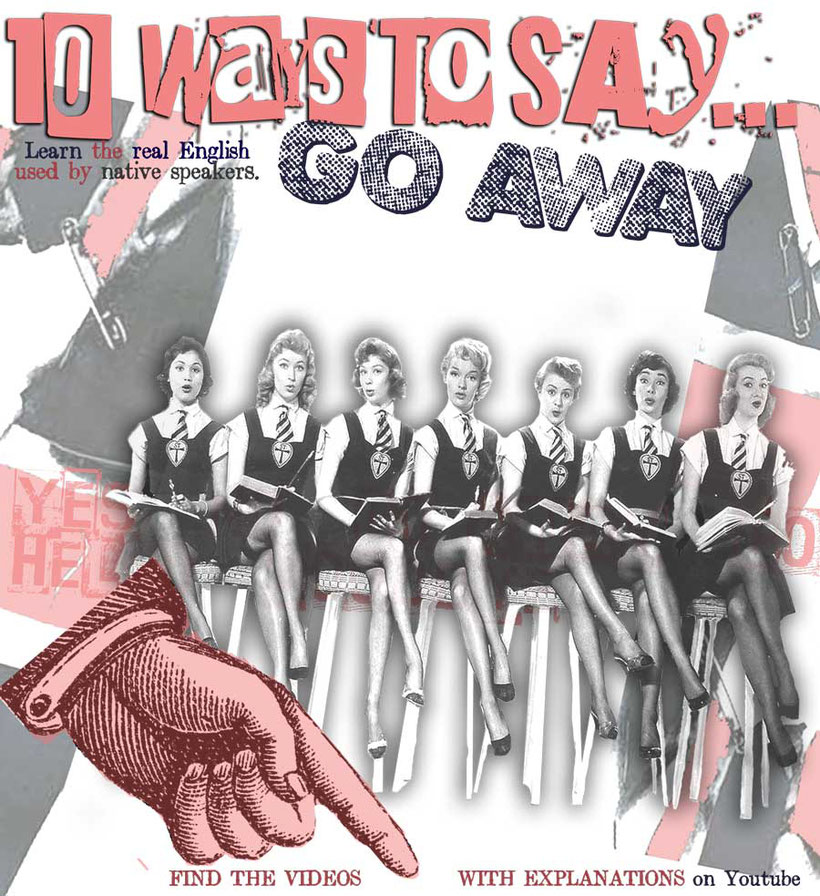

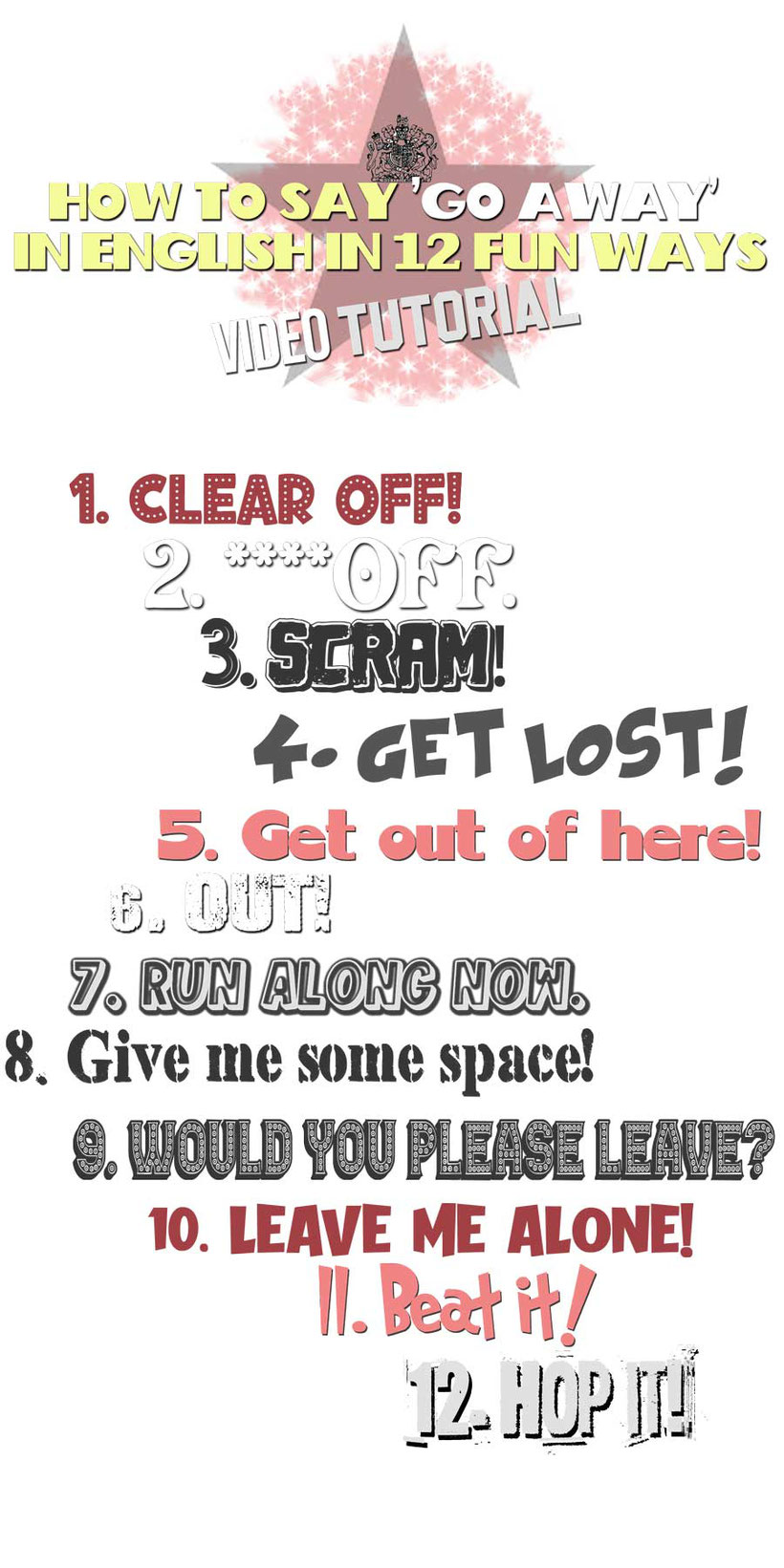
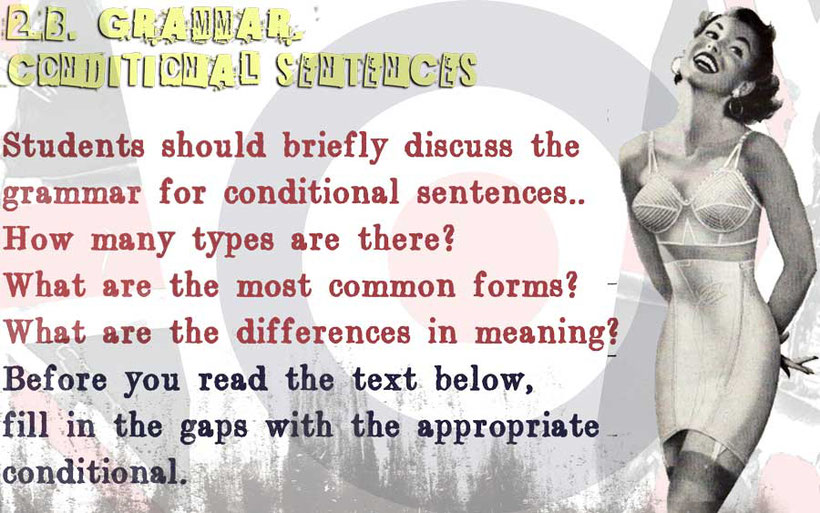
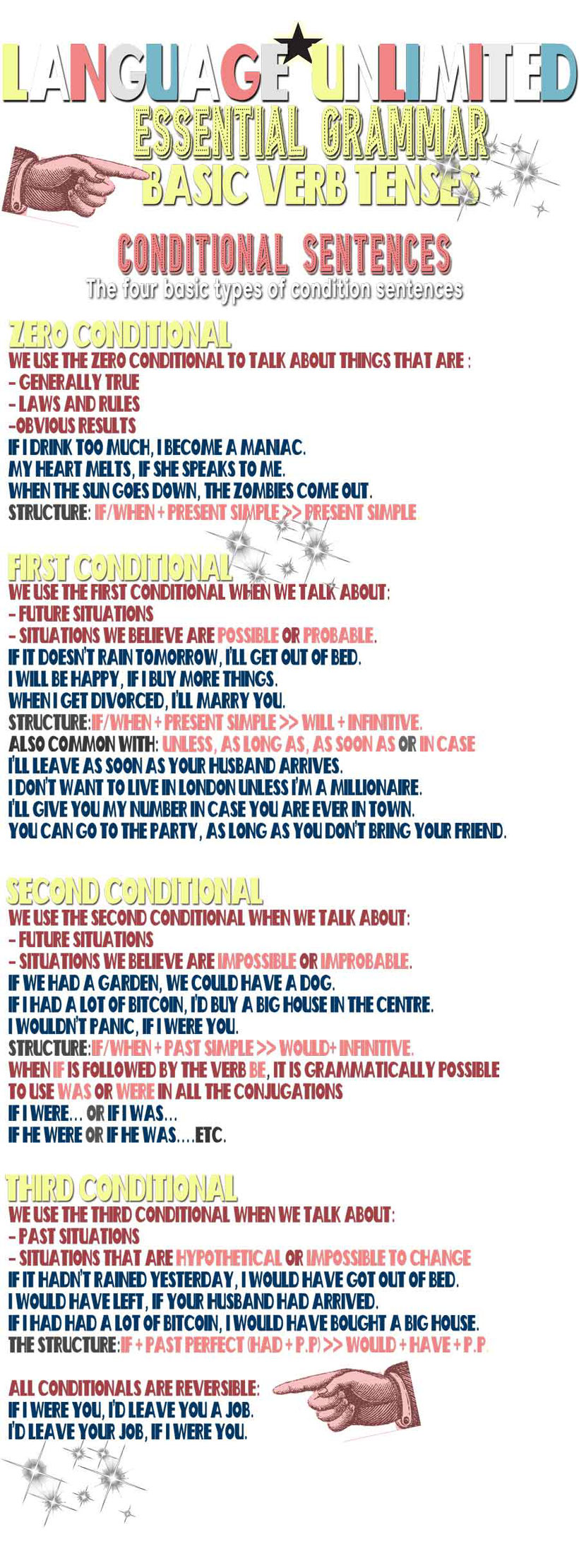
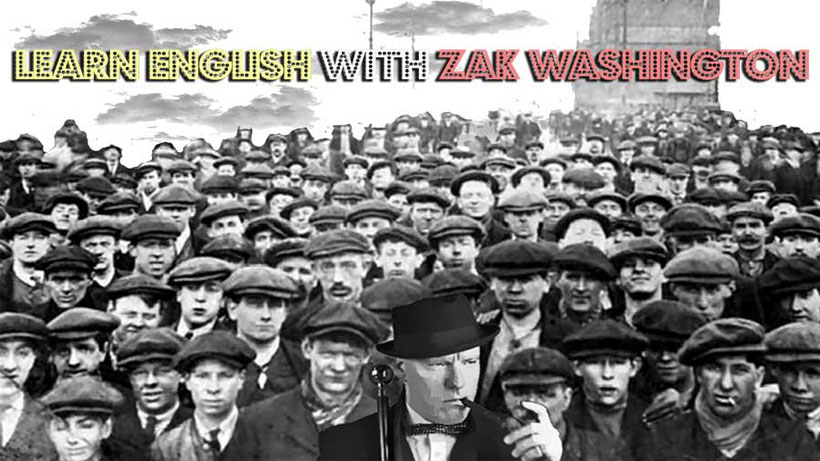


CHAPTER 2 SONG 2 -IN THE JOB CLUB
INSTRUCTIONS: 1 FILL IN the blank spaces. 2 LISTEN to the song for the answers.
ZAK WASHINGTON: In the Job Club they help poor, unfortunate unemployed souls (SP: almas IT: vivo) like me, to look for work.
GIOVANNI: But you’ve got a job!
ZAK WASHINGTON: Shut up! (SP: cállate IT: piantala, sta 'zitto)
GIOVANNI: This is very depressing. These poor people cannot get jobs. My father works twelve hours a day in the fields in Italy, six days a week. But for these poor people the situation is even worse!
ZAK WASHINGTON: What rubbish! (SP: tonterieas IT: sciocchezze, stupidaggini) If you _________ (to have) a brain (SP: cerebro IT: cervello), you ____________ (to be) dangerous. Most of these people like it here. Let me explain. But first, we have to get back to my flat. I need to take off (SP: quitar IT: togliere) these nice, smart (SP: elegante IT: elegante) clothes and put on something older, nastier[1] and more horrible.
MARIA: Why? Are you going to repair the car or something?
ZAK WASHINGTON: No, I have a job interview.
GIOVANNI: I _________ (to wear) something smarter and more elegant, if I __________ (to have) a job interview in Italy.
ZAK WASHINGTON: Yeah. I don’t want the job. I want the dole money!
GIOVANNI: If you ________ (to get) the job, it __________(to be) great!
ZAK WASHINGTON: No, it won’t! It’ll be a complete disaster. The job will be awful. At the moment they give me money and pay my rent. If I _________ (to get) the job, they ____________ (to pay) me £10 extra for doing an extra forty hours a week. Plus I ________ (to lose) my UB40 and the right to cheap entrance to the theatre, the cinema, art galleries, concerts, cheap international flights etc, etc. I don’t want the bleeding job!
GIOVANNI: This is crazy! My father works twelve hours a day, and you get more money than him, for doing nothing. Then, when they offer you a good job, you don’t want it.
[1] nasty (adj.) (SP: horrible, asqueroso IT: cattiva) horrible, awful, bad taste (for things), mean, unpleasant, cruel (for people). Noun; nastiness.

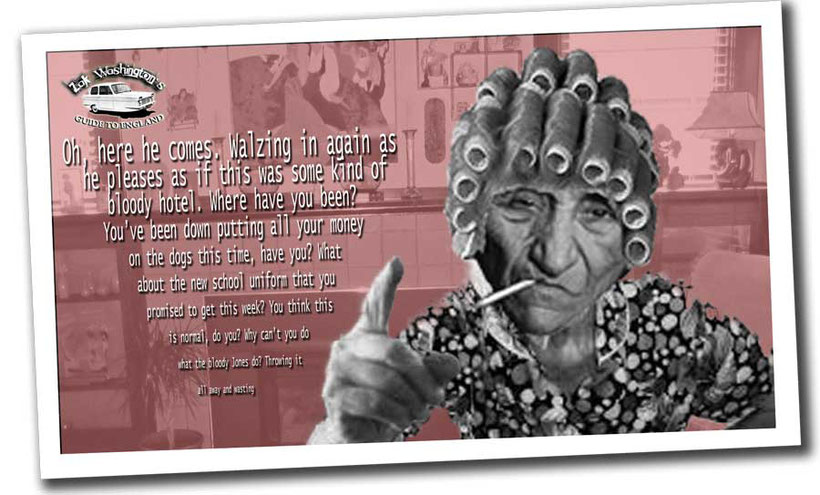
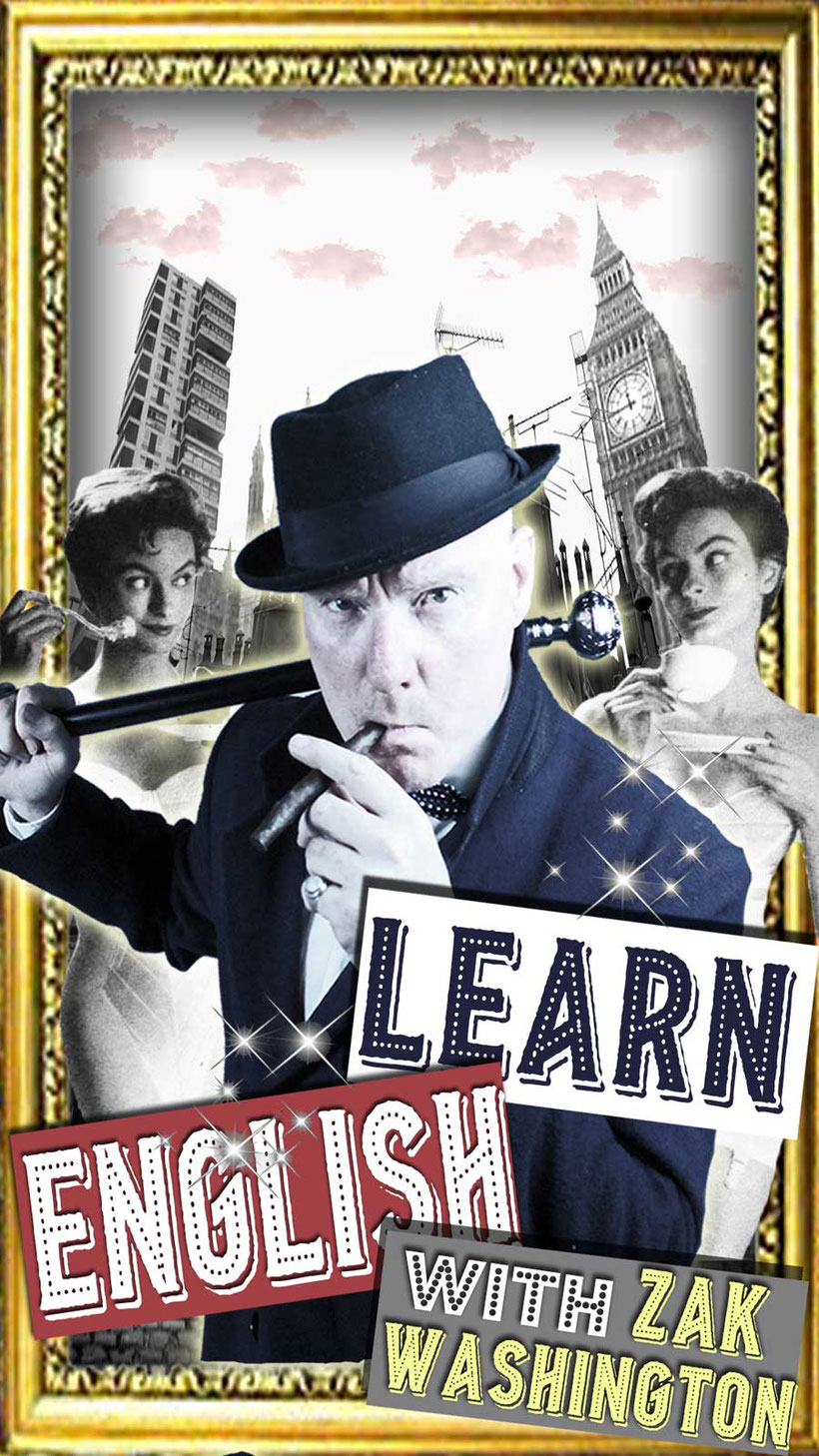
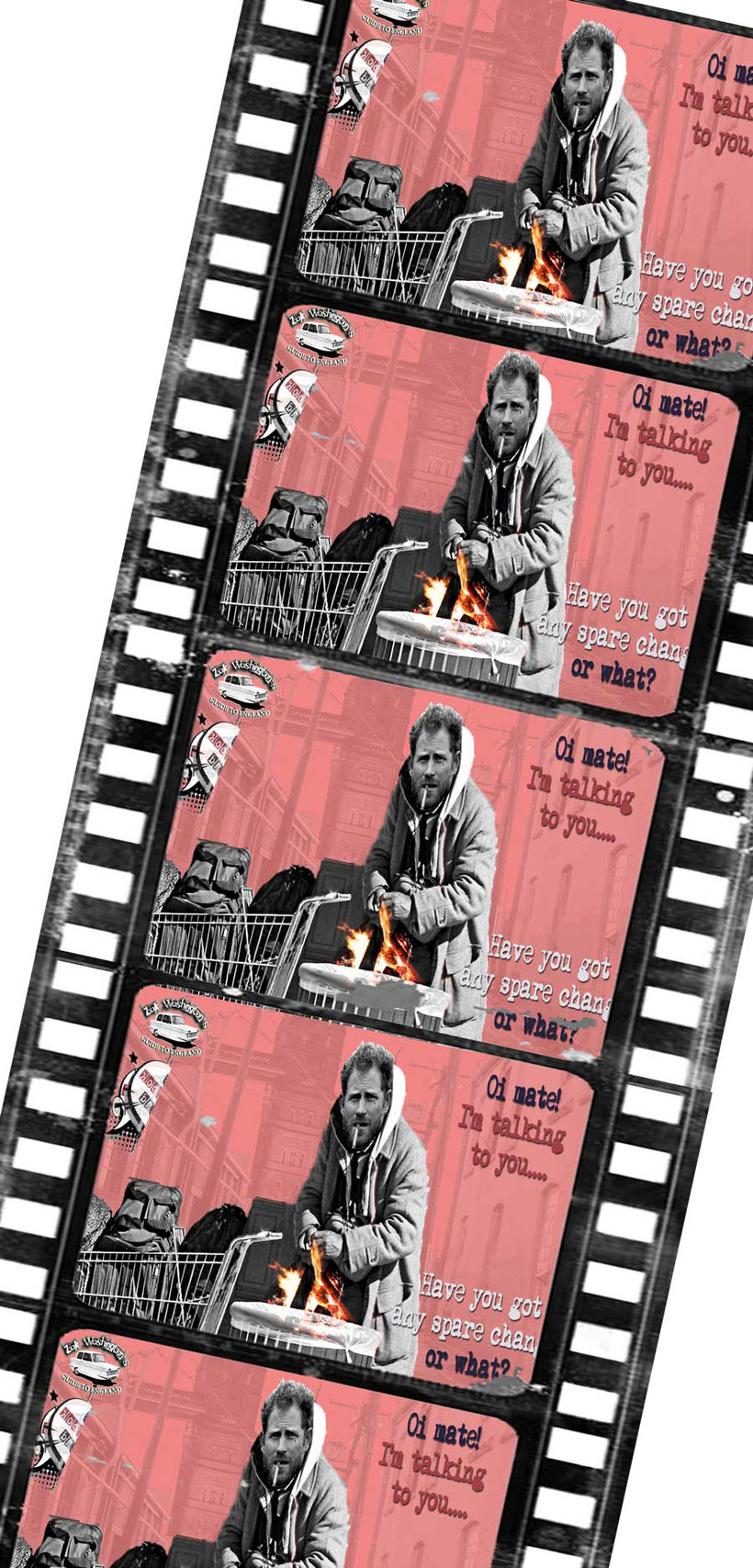
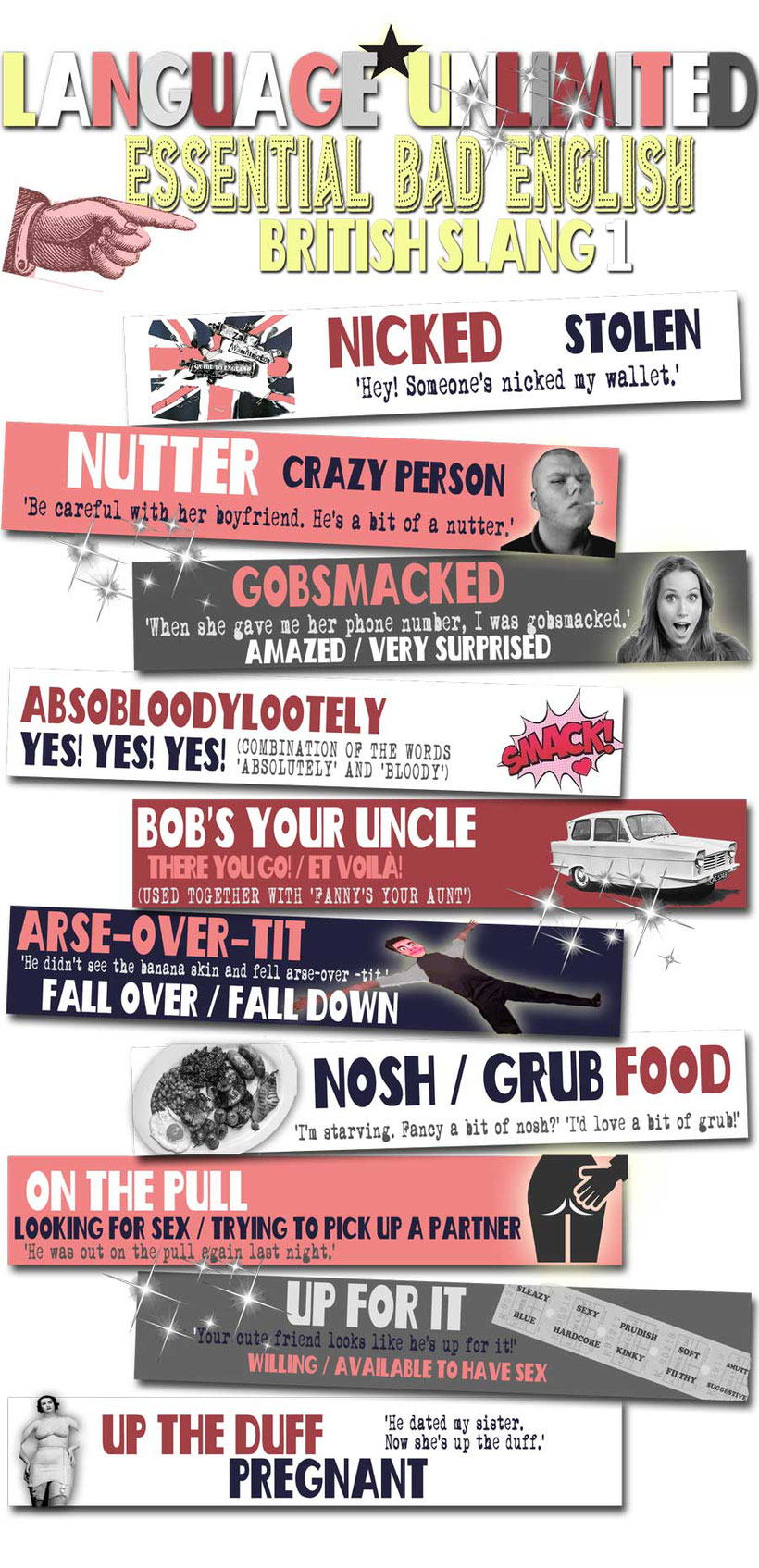
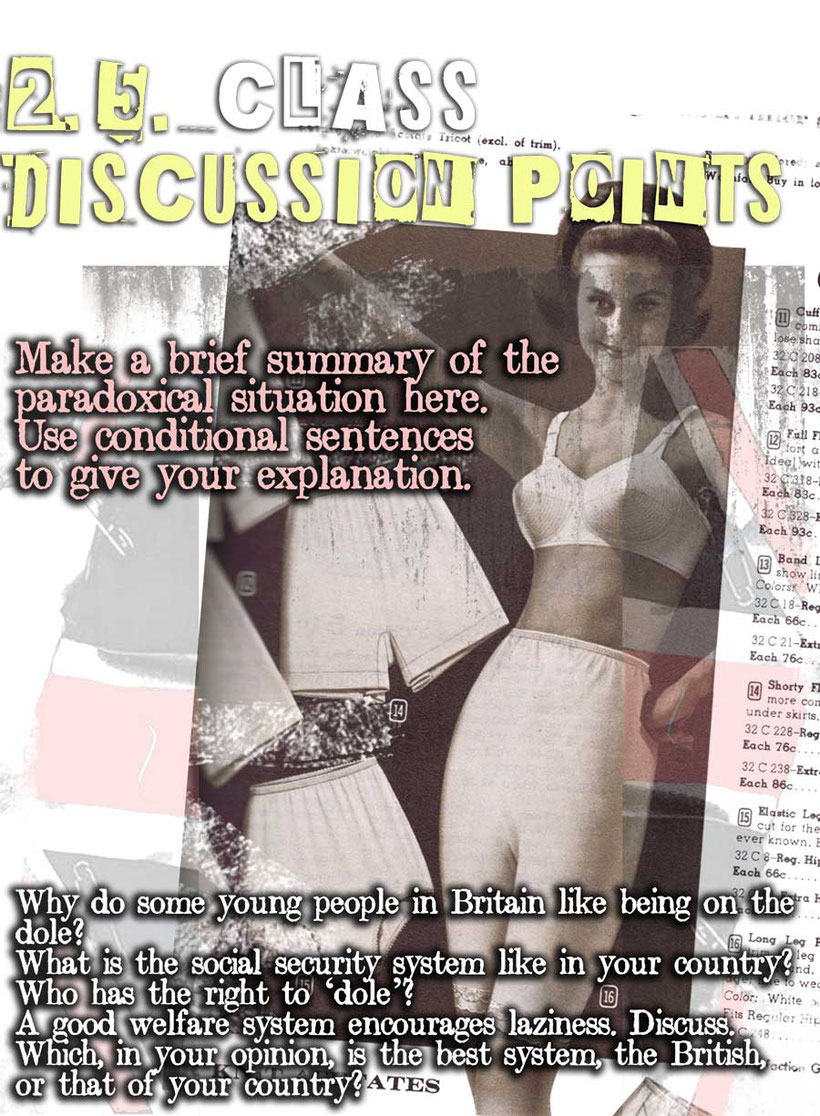
(Later that day.)
ZAK WASHINGTON: Hey! Giovanni! What’s up? Fantastic news. I didn’t get the job. Let’s celebrate! Everything went really well. I found an old jacket in the garden shed[1], that looked clean, but smelt of horses. I was very polite and enthusiastic. I told them that the job would help me to get over my drug habit. They couldn’t wait to get rid of me[2].
[1] Shed (noun) (SP: cobertizo IT: rimessa) small simple house-like structure normally found in typical English gardens to keep tools etc.
[2] To get rid of (SP: eliminar, deshacerse de IT: butta fuori, liberarsi di) to throw away, to eliminate, to reject etc. Can refer to almost anything. Old cars, rubbish, girlfriends etc.
SPEAKING PRACTICE ACTIVITY ROLE-PLAY
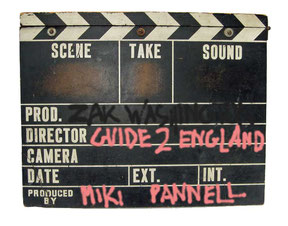
Student A. You are the person responsible for giving interviewers in a small London restaurant called the Kebab Delight. You need someone to wash up (SP: lavar los platos IT: lavare i piatti) and do all the dirty jobs (SP: trabajos sucios IT: lavori sporchi) in the kitchen that no-one else will do.
Nobody, for example, has cleaned the bathroom for nearly two years. Someone will have to take those vegetables and bread out of the fridge that you brought last September. It’s a disgusting job with long hours and very little money. Only an idiot would do it! Try to make the job sound as professional as possible. You will need to carefully think of some questions to ask. Obviously, you will need to use all the different tenses. When did you finish school? What have you studied since then? How long have you been claiming dole! etc. What are your plans for the future? etc. You can also use some of the questions from the ‘real’ job interview questions below.
Student B. You are the unemployed person who wants not to get the job. That’s right! You do not want the job. You want to be free and have fun. But you must go to the interview, if you want to continue getting money from the social security. Be careful! (SP: ten cuidado IT: stai attento) If you are too nice and too convincing, you will get the job. This will be a disaster. You don’t want to lose your dole money (SP: paro IT: indennità di disoccupazione), or your free time, especially to work 60 hours a week for the same money. So you must find a delicate balance between appearing to want the job… and appearing to be mad. You must act as if you are a little crazy, dangerous or unpleasant (SP: desagradable, antipático IT: antipatico, sgradevole).
Article from ZAKMAG, our complimentary easy English learning magazine.
MEET BRITAIN'S BIGGEST 'DOLE SPONGER'.
(SP: gorrón IT: scroccone) GRAPHIC VERSION (Copy and paste version below)
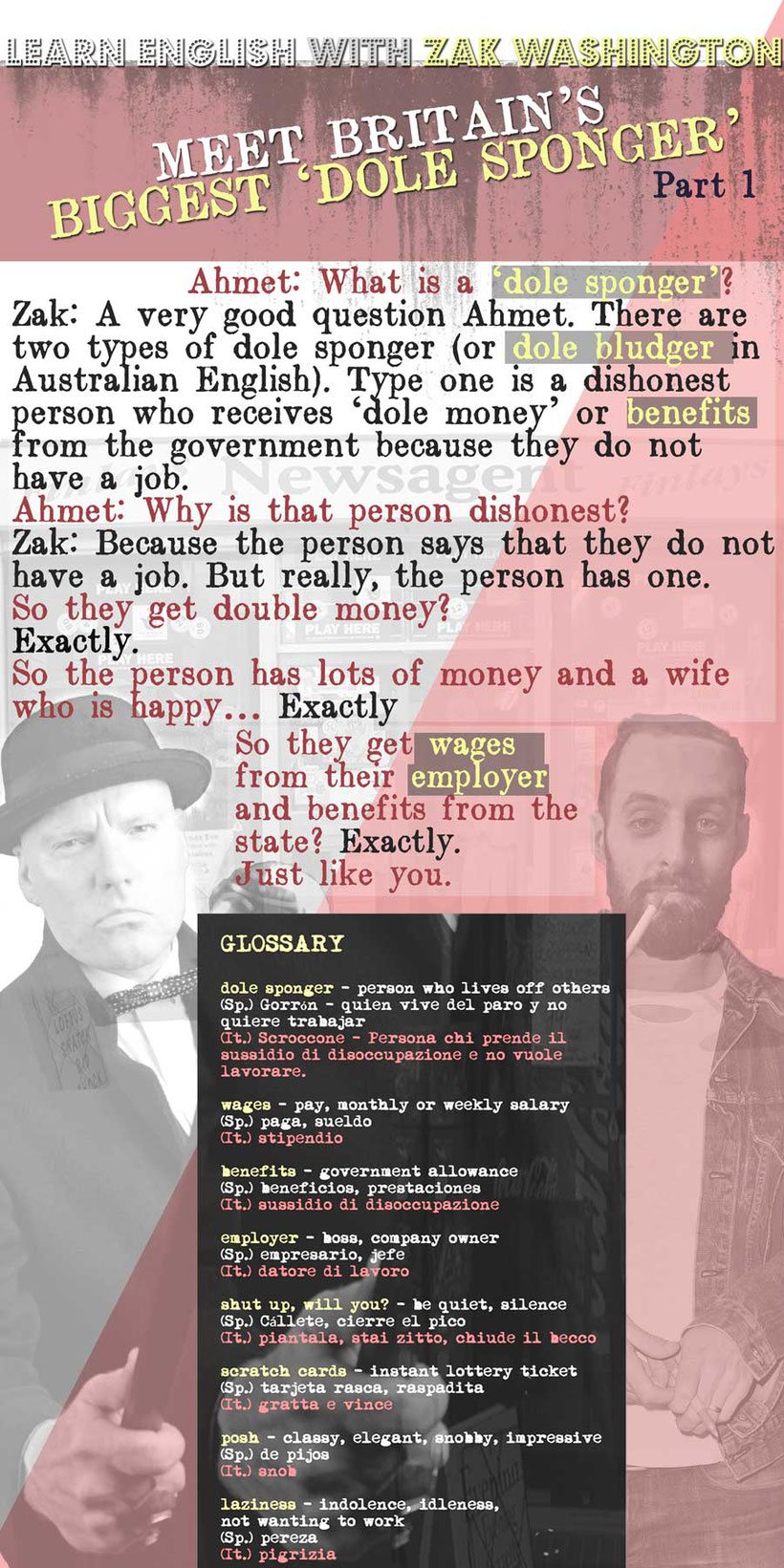
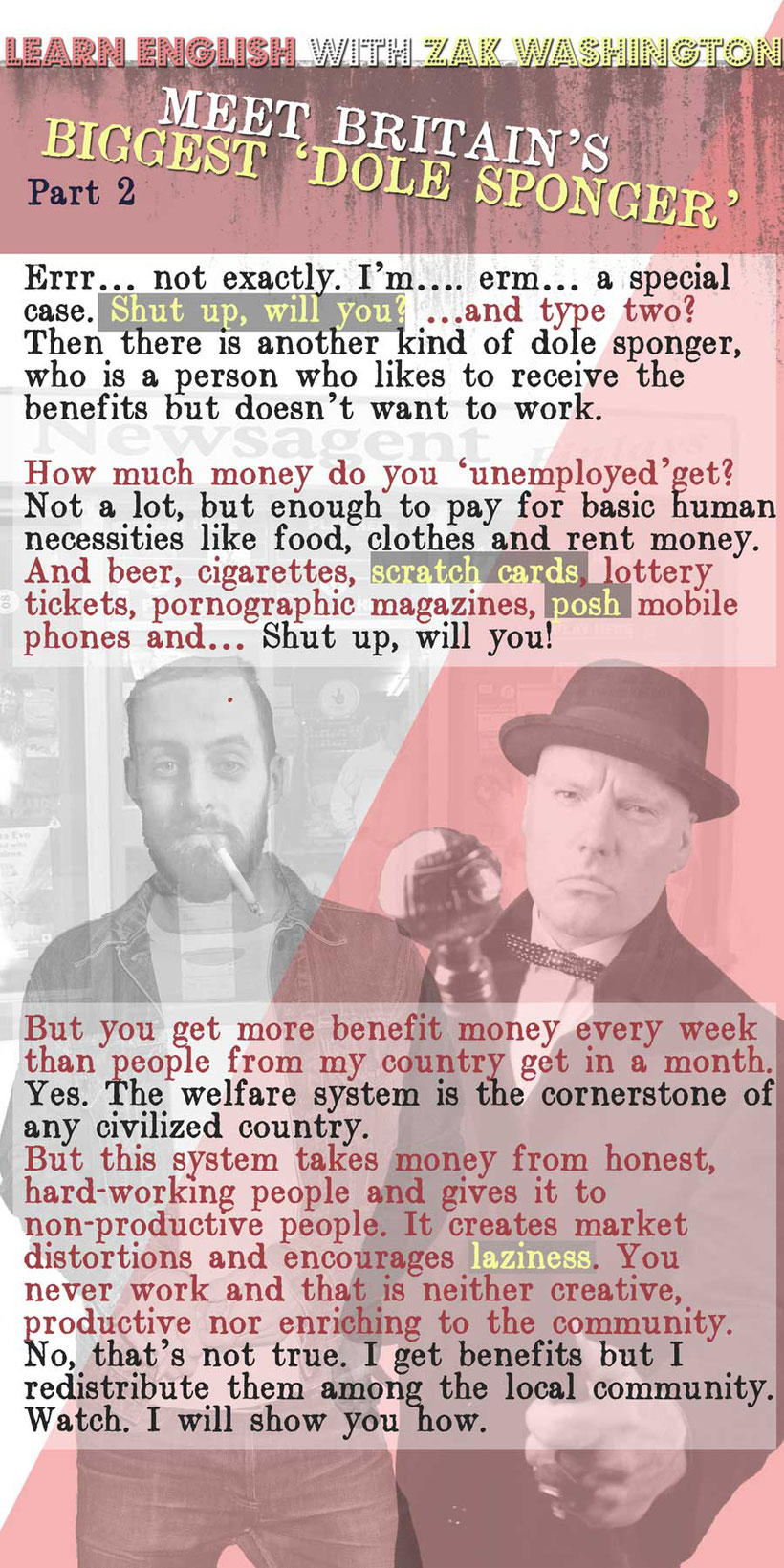
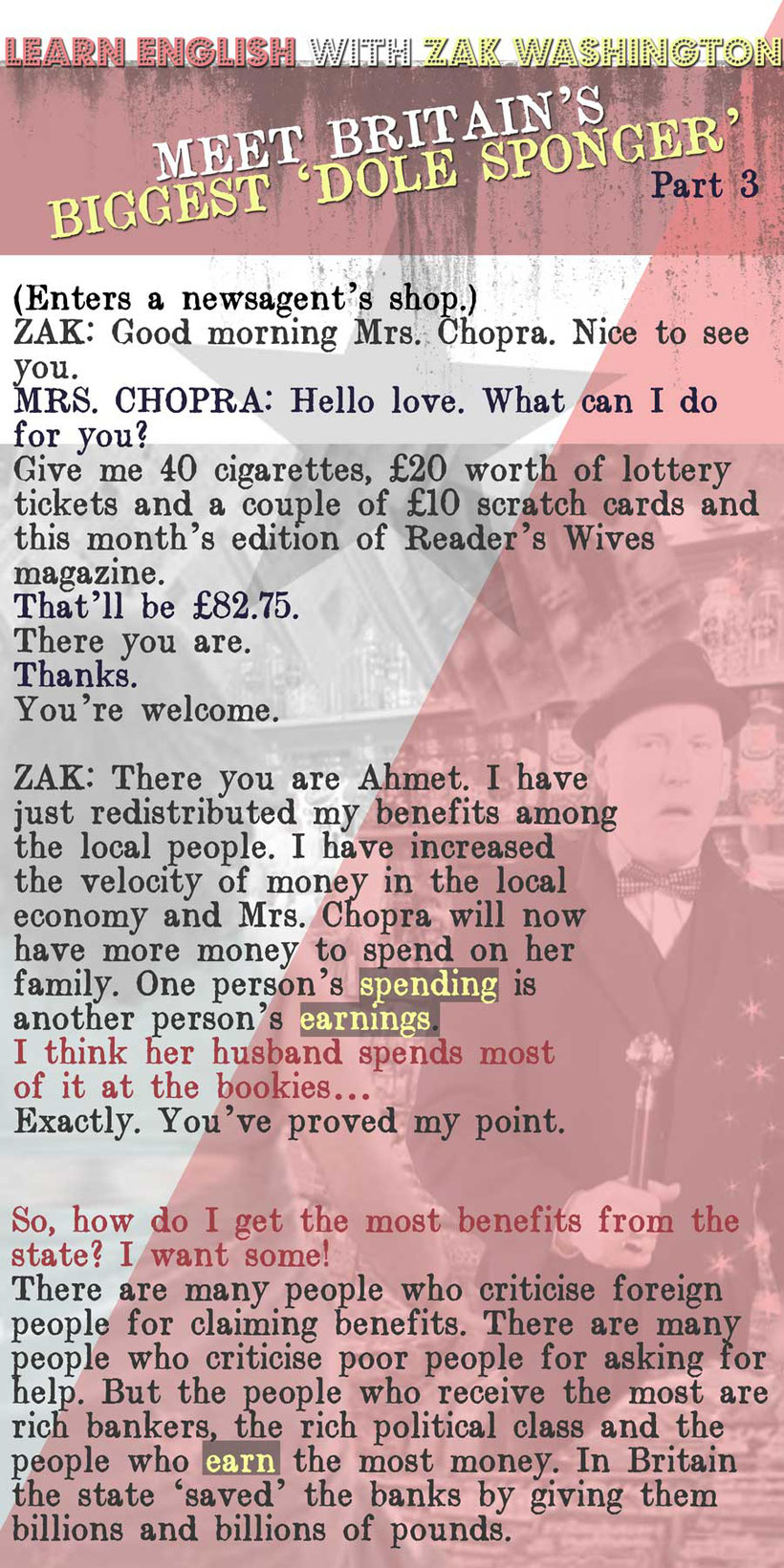
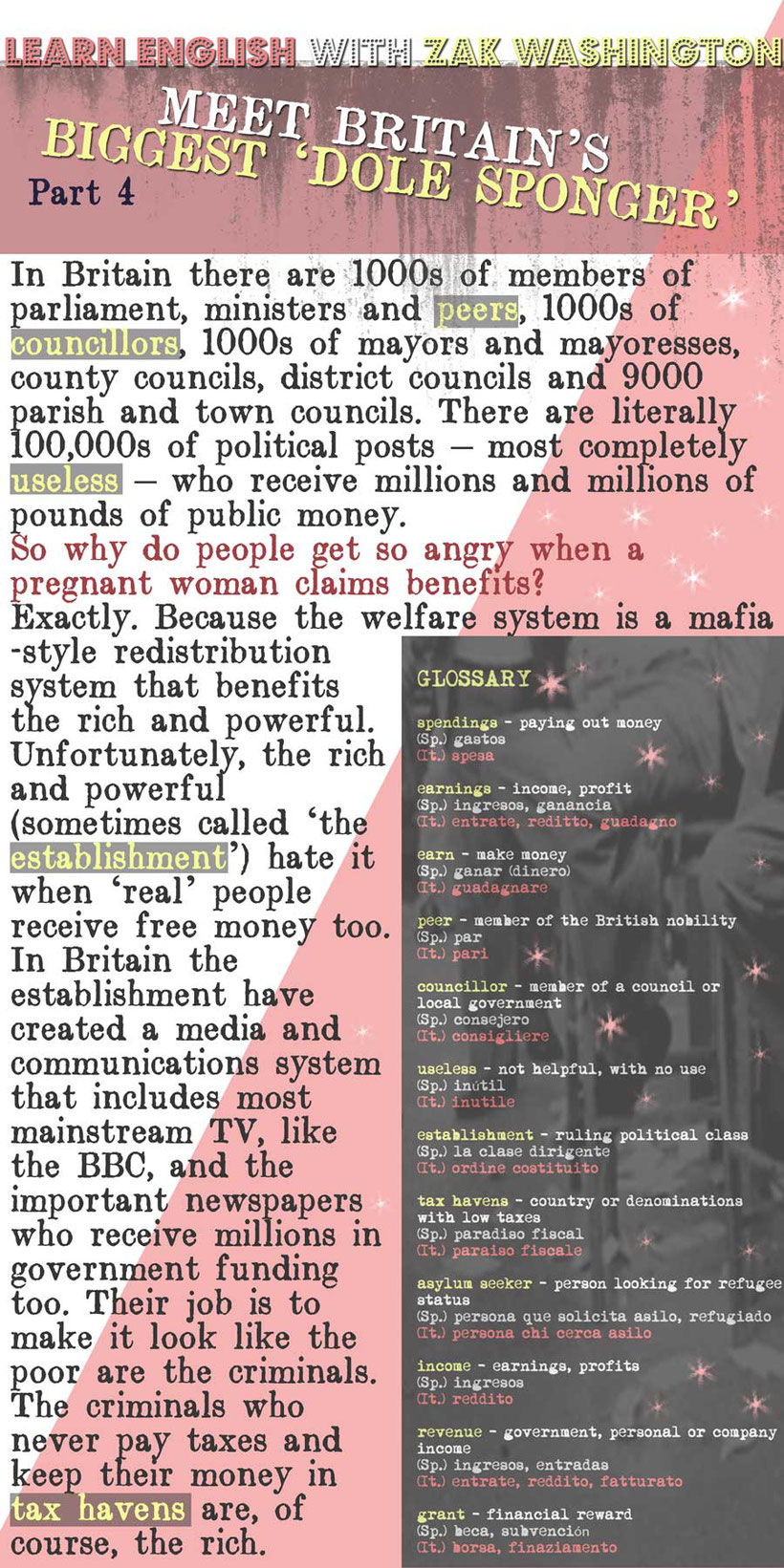
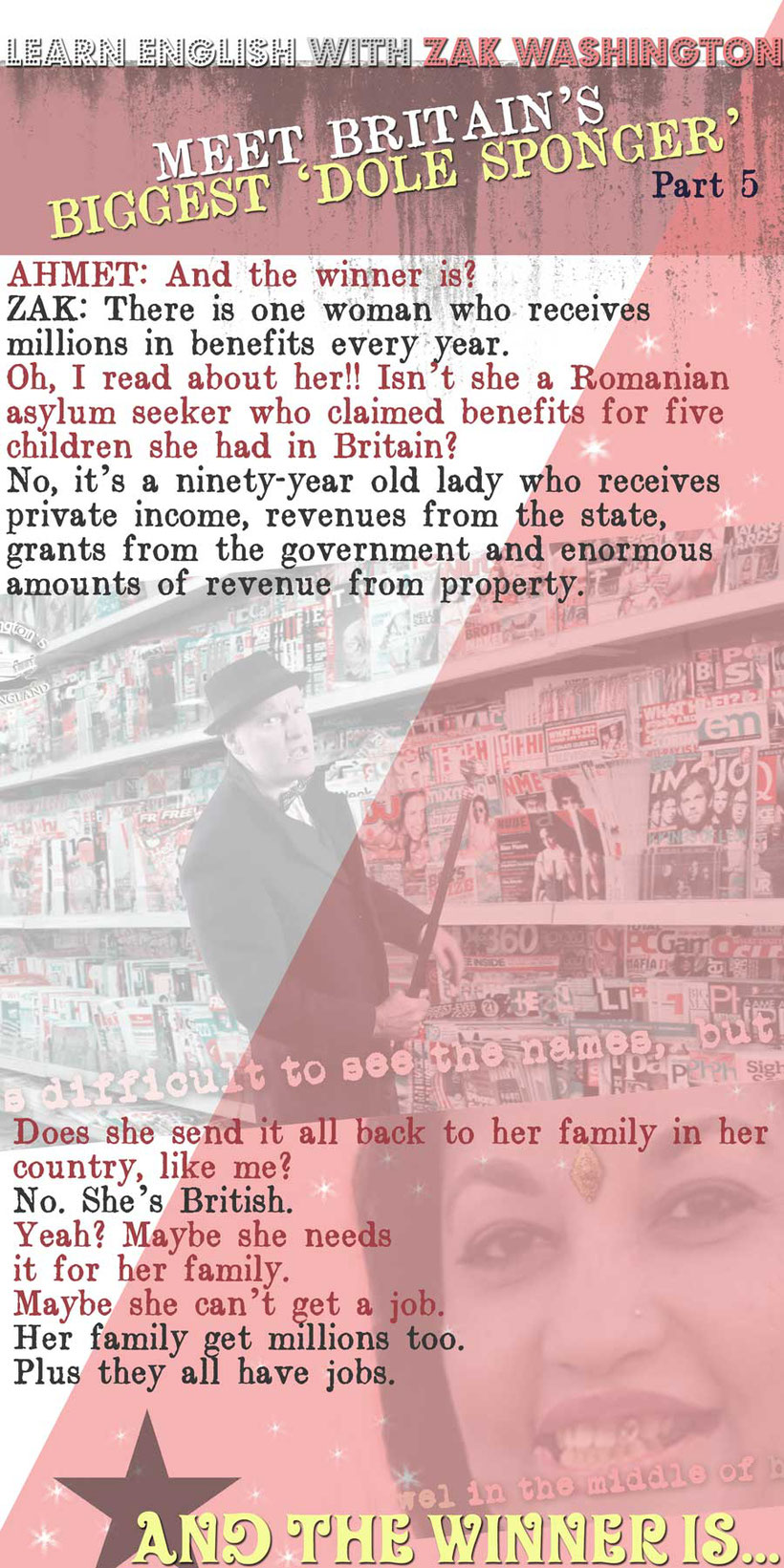
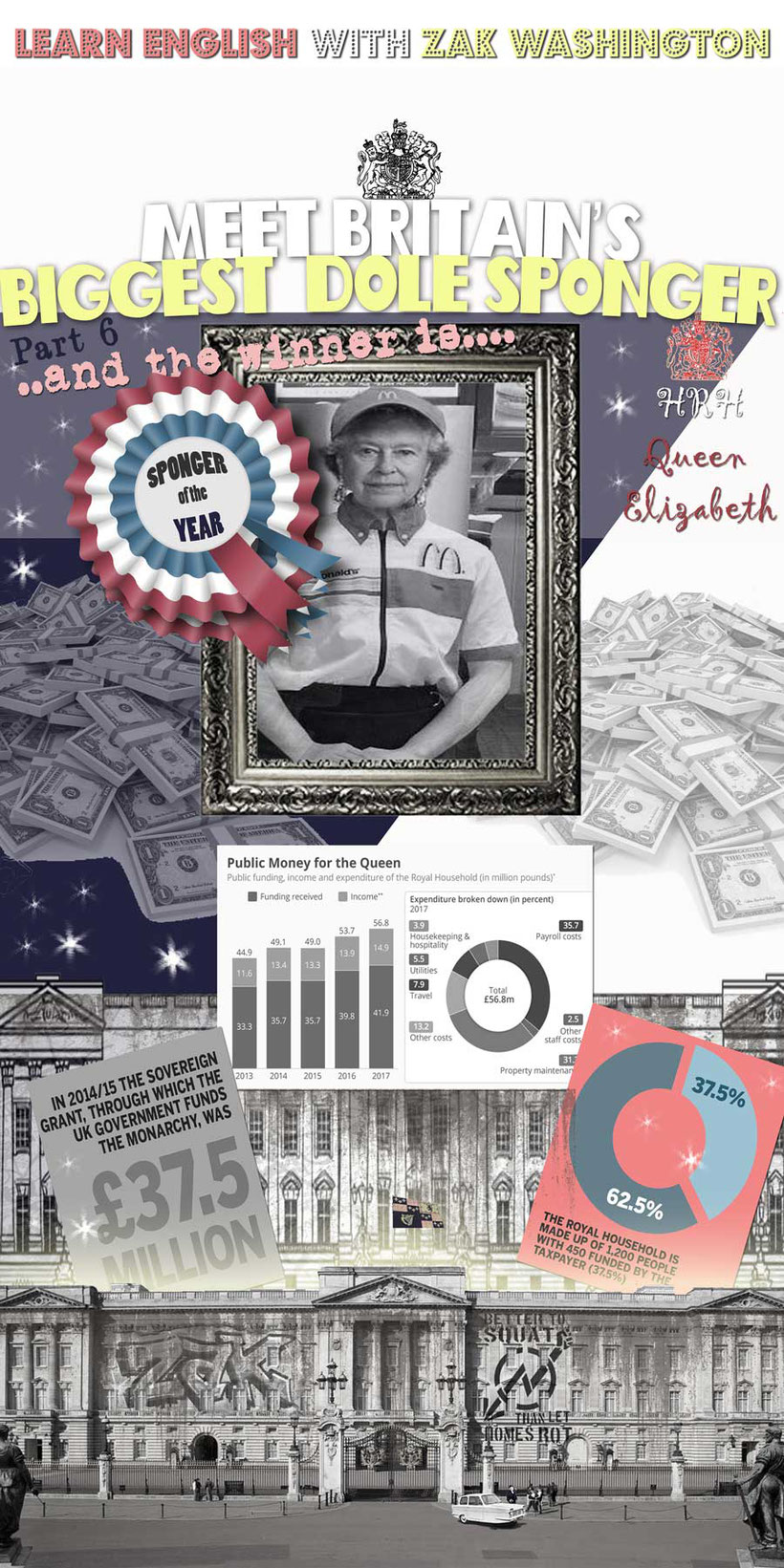
CUT AND PASTE VERSION:
MEET BRITAIN’S BIGGEST ‘DOLE SPONGER’
Ahmet: What is a ‘dole sponger’?
Zak: A very good question Ahmet. There are two types of dole sponger (or dole bludger in Australian English). (SP: gorrón IT: scroccone) Type one is a dishonest person who receives ‘dole money’ or benefits from the government because they do not have a job.
Ahmet: Why is that person dishonest?
Zak: Because the person says that they do not have a job. But really, the person has one.
So they get double money?
Exactly.
So the person has lots of money and a wife who is happy…
Exactly.
So they get wages from their employer (SP: empleador IT: dattore di lavoro) and benefits from the state?
Exactly.
Just like you.
Errr… not exactly. I’m…. erm… a special case. Shut up, will you (SP: calláte IT: stai 'zitto) ?
…and type two?
Then there is another kind of dole sponger, who is a person who likes to receive the benefits but doesn’t want to work.
How much money do you ‘unemployed’ people get?
Not a lot, but enough to pay for basic human necessities like food, clothes and rent money.
And beer, cigarettes, scratch cards (SP: rasca y gana IT: grata e vinci) , lottery tickets, pornographic magazines, posh (SP: de lujo IT: snob, elegante) mobile phones and…
Shut up, will you!
But you get more benefit money every week than people from my country get in a month.
Yes. The welfare system is the cornerstone of any civilized country.
But this system takes money from honest, hard-working people and gives it to non-productive people. It creates market distortions and encourages laziness (SP: perreza IT: pigrizia) . You never work and that is neither creative, productive nor enriching (SP: enriquecer IT: arricchire) to the community.
No, that’s not true. I get benefits but I redistribute them among the local community. Watch. I will show you how.
(Enters a newsagent’s shop.)
Good morning Mrs. Chopra. Nice to see you.
Hello love. What can I do for you?
Give me forty cigarettes, £20 worth of lottery tickets and a couple of £10 scratch cards and this month’s edition of Reader’s Wives magazine.
That’ll be £82.75.
There you are.
Thanks.
You’re welcome.
There you are Ahmet. I have just redistributed my benefits among the local people. I have increased the velocity of money in the local economy and Mrs. Chopra will now have more money to spend on her family. One person’s spending (SP: gastos IT: spesa) is another person’s earnings (SP: ganancias IT: guadagno) .
I think her husband spends most of it at the bookies (SP: casa de apuestas IT: negozi di scommesse) …
Exactly. You’ve proved my point.
So, how do I get the most benefits from the state? I want some!
There are many people who criticise foreign people for claiming benefits. There are many people who criticise poor people for asking for help. But the people who receive the most are rich bankers, the rich political class and the people who earn (SP: ganan IT: guadagnare) the most money. In Britain the state ‘saved’ the banks by giving them billions and billions of pounds. In Britain there are 1000s of members of parliament, ministers and peers (SP: pares IT: pari) , 1000s of councillors (SP: consejeros IT: consiglieri) , 1000s of mayors and mayoresses (SP: alcaldes IT: sindaci) , county councils, district councils and 9000 parish and town councils. There are literally 100,000s of political posts – most completely useless – who receive millions and millions of pounds of public money.
So why do people get so angry when a pregnant woman (SP: mujer embarazada IT: donna in cinta) claims benefits?
Exactly. Because the welfare system is a mafia-style redistribution system that benefits the rich and powerful. Unfortunately, the rich and powerful (sometimes called ‘the establishment’) hate it when ‘real’ people receive free money too. In Britain the establishment have created a media and communications system that includes most mainstream TV, like the BBC, and the important newspapers who receive millions in government funding too. Their job is to make it look like the poor are the criminals. The criminals who never pay taxes and keep their money in tax havens (SP: paradisos fiscales IT: paradisi fiscali) are, of course, the rich.
And the winner is?
There is one woman who receives millions in benefits every year.
Oh, I read about her!! Isn’t she a Romanian asylum seeker (SP: solicitante di asilo IT: richiedente asilo) who claimed benefits for five children she had in Britain?
No, it’s a ninety-year old lady who receives private income, revenues from the state, grants from the government and enormous amounts of revenue from property.
Does she send it all back to her family in her country, like me?
No. She’s British.
Yeah? Maybe she needs it for her family. Maybe she can’t get a job.
Her family get millions too. Plus they all have jobs.

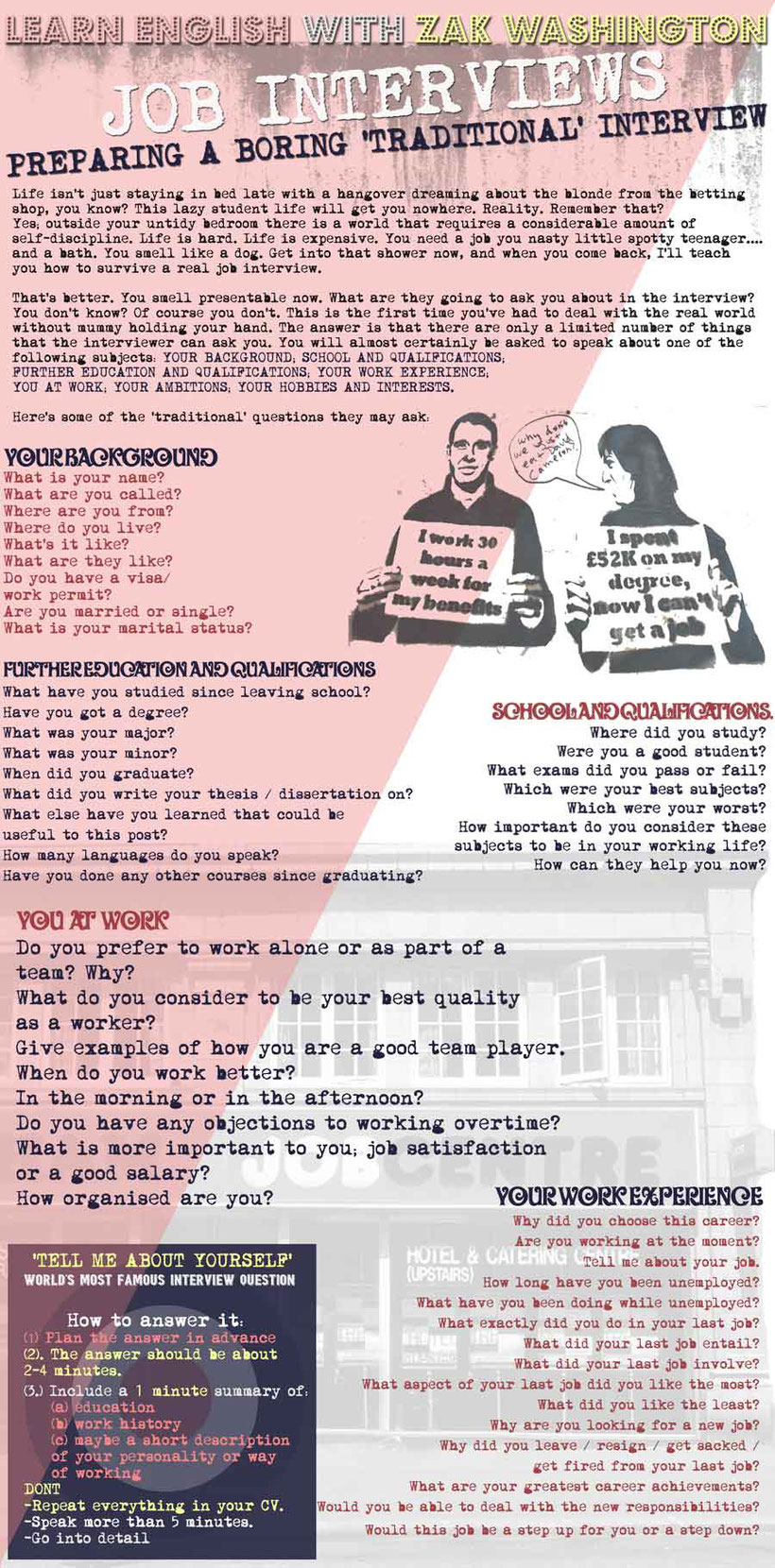
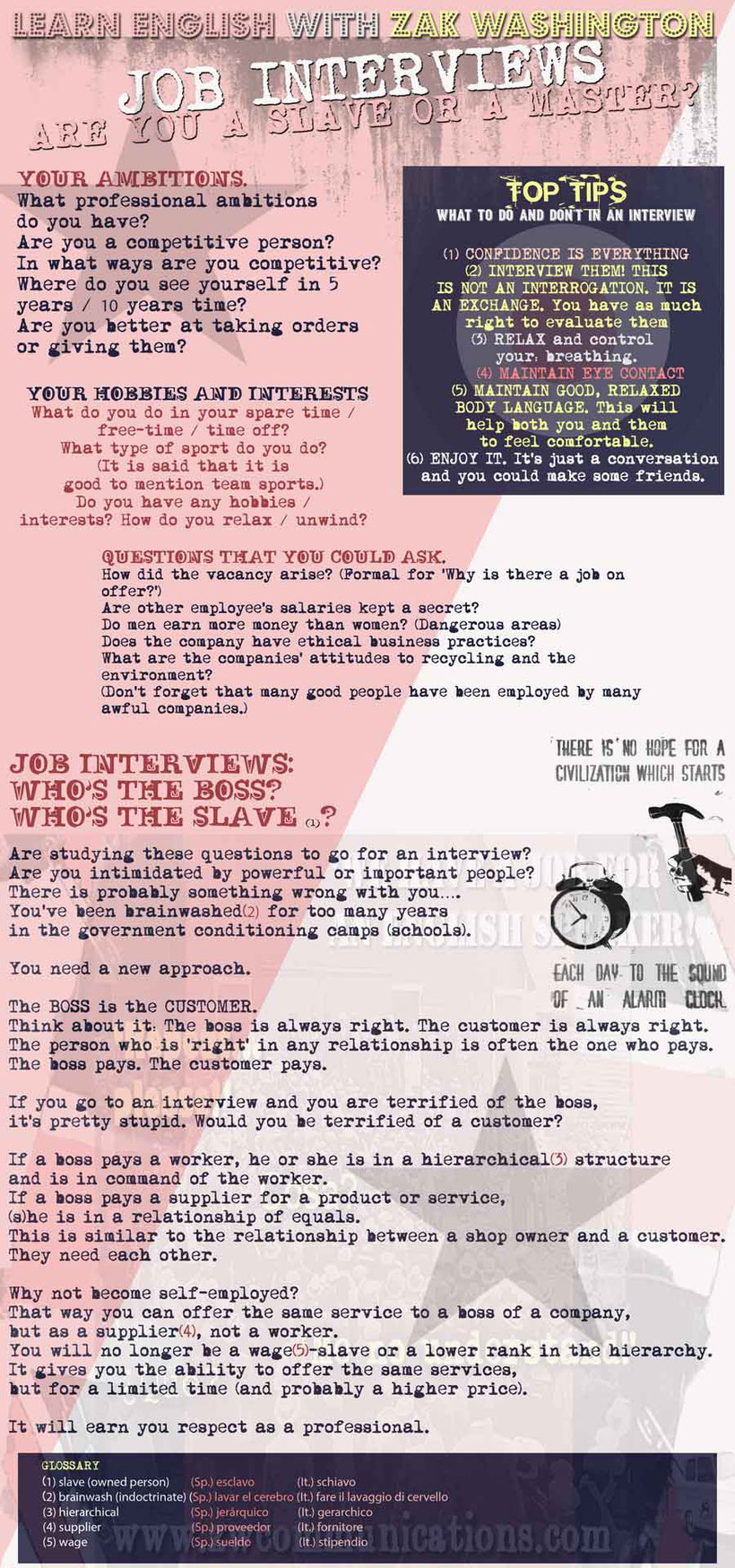

Cut and paste version:
ENGLISH CONVERSATION PRACTICE HOW TO DO A JOB INTERVIEW IN ENGLISH
PREPARING A REAL JOB INTERVIEW.
Life isn’t just staying in bed late with a hangover dreaming about the blonde from the betting shop, you know? This lazy student life will get you nowhere. Reality. Remember that? Yes; outside your untidy bedroom there is a world that requires a considerable amount of self-discipline. Life is hard. Life is expensive. You need a job you nasty little spotty teenager....and a bath. You smell like a dog. Get into that shower now, and when you come back, I’ll teach you how to survive a real job interview.
That’s better. You smell presentable now. What are they going to ask you about in the interview? You don’t know? Of course you don’t. This is the first time you’ve had to deal with the real world without mummy holding your hand. The answer is that there are only a limited number of things that the interviewer can ask you. You will almost certainly be asked to speak about one of the following subjects:
YOUR BACKGROUND
SCHOOL AND QUALIFICATIONS
FURTHER EDUCATION AND QUALIFICATIONS
YOUR WORK EXPERIENCE
YOU AT WORK
YOUR AMBITIONS
YOUR HOBBIES AND INTERESTS
Let’s list some of the possible questions that they could ask you.
‘TELL ME ABOUT YOURSELF’
World’s most famous interview question
How to answer it:
(1) Plan the answer in advance
(2) The answer should be about
2-4 minutes.
(3) Include a 1 minute summary of:
(a) education
(b) work history
(c) maybe a short description
of your personality or way
of working
DON'T
-Repeat everything in your CV.
-Speak more than 5 minutes.
-Go into detail
YOUR BACKGROUND.
What is your name?
What are you called?
Where are you from?
Where do you live?
What’s it like?
Tell me about yourself.
Tell me about your family?
What are they like?
Do you have a visa / work permit?
Are you married or single? /
What is your marital status?
SCHOOL AND QUALIFICATIONS.
Where did you study?
Were you a good student?
What exams did you pass or fail?
Which were your best subjects?
Which were your worst?
How important do you consider these subjects to be in your working life?
How can they help you now?
FURTHER EDUCATION AND QUALIFICATIONS.
What have you studied since leaving school?
Have you got a degree?
What was your major?
What was your minor?
When did you graduate?
What did you write your thesis / dissertation on?
What else have you learned that could be useful to this post?
How many languages do you speak?
Have you done any other courses since graduating?
YOUR WORK EXPERIENCE.
Why did you choose this career?
Are you working at the moment?
Tell me about your job.
How long have you been unemployed?
What have you been doing while you were unemployed?
What exactly did you do in your last job?
What did your last job entail?
What did your last job involve?
What aspect of your last job did you like the most?
What did you like the least?
Why are you looking for a new job?
Why did you leave / resign / get sacked / get fired from your last job?
What are your greatest career achievements?
Would you be able to deal with the new responsibilities?
Would this job be a step up for you or a step down?
YOU AT WORK.
Do you prefer to work alone or as part of a team? Why?
What do you consider to be your best quality as a worker?
Give examples of how you are a good team player.
When do you work better?
In the morning or in the afternoon?
Do you have any objections to working overtime?
What is more important to you; job satisfaction or a good salary?
How organised are you?
YOUR AMBITIONS.
What professional ambitions do you have?
Are you a competitive person?
In what ways are you competitive?
Where do you see yourself in five years / ten years time?
Are you better at taking orders or giving them?
YOUR HOBBIES AND INTERESTS.
What do you do in your spare time / free-time / time off?
What type of sport do you do? (It is said that it is good to mention team sports.)
Do you have any hobbies / interests?
How do you relax / unwind?
QUESTIONS THAT YOU COULD ASK.
How did the vacancy arise? (A formal way of saying ‘Why is there a job on offer?')
Are other employee’s salaries kept a secret?
Do men earn more money than women? (These are dangerous areas, as money is not usually mentioned in interviews.)
Does the company have ethical business practices?
What are the companies’ attitudes to recycling and the environment? (Don’t forget that many good people have been employed by many awful companies. The company is as much on trial as you are. This is not a one-sided interrogation. You should ask plenty of questions too, to find out what the business is really like, and if it is good enough for you. Also you should not appear to be a ‘yes-man’ who childishly agrees with everything. Express yourself.)
Class: Now get together with a partner and practice some of these.
TOP TIPS WHAT TO DO AND DON’T IN AN INTERVIEW
(1) CONFIDENCE IS EVERYTHING
(2) INTERVIEW THEM! THIS
IS NOT AN INTERROGATION. IT IS
AN EXCHANGE. You have as much
right to evaluate them
(3) RELAX and control
your: breathing.
(4) MAINTAIN EYE CONTACT
(5) MAINTAIN GOOD, RELAXED
BODY LANGUAGE. This will
help both you and them
to feel comfortable.
(6) ENJOY IT. It’s just a conversation
and you could make some friends.
JOB INTERVIEWS: WHO IS THE SLAVE AND WHO IS THE MASTER
Are studying these questions to go for an interview?
Are you intimidated by more powerful or important people?
Then there is probably something wrong with you….
You’ve been brainwashed for too many years in the government conditioning camps (schools).
You need a new approach.
The first thing you need to know is that the boss is the customer.
Think about it: The boss is always right. The customer is always right.
The person who is ‘right’ in any relationship is often the one who pays.
The boss pays. The customer pays.
If you go to an interview and you are terrified of the boss, it’s pretty stupid.
Would you be terrified of a customer?
If a boss pays a worker, he or she is in a hierarchical structure and is in command of the worker.
If a boss pays a supplier for a product or service, he or she is in a relationship of equals.
This is similar to the relationship between a shop owner and a customer. They need each other.
Why not become self-employed? That way you can offer the same service to a boss of a company, but as a supplier, not a worker. You will no longer be a wage-slave or a lower rank in the hierarchy. It gives you the ability to offer the same services, but for a limited time (and probably a higher price).
It will earn you respect as a professional.
Now you are...
IN THE JOB CENTRE

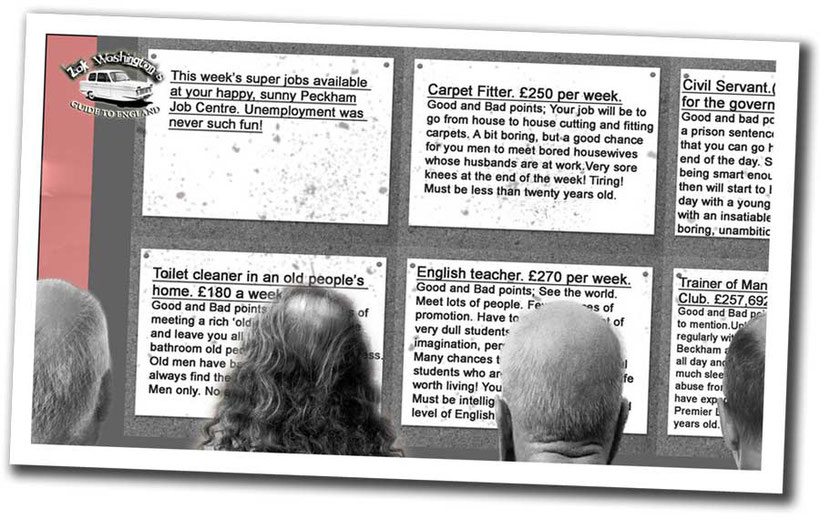
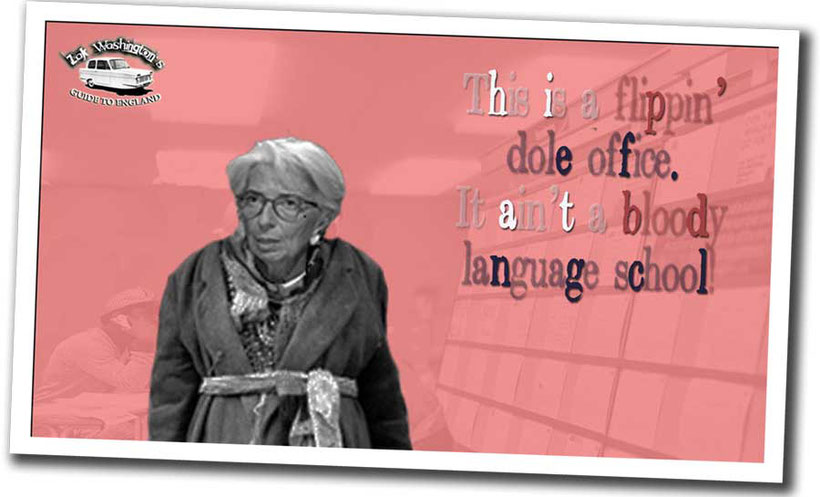
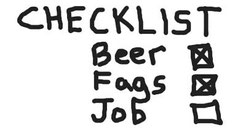

CLASSROOM COMMUNICATION ACTIVITY
Cut out the cards below and stick (SP: pegarse IT: attaccare) them on the wall. Make your classroom look like (SP: aparecer IT: assomigliare) a jobcentre. When you have done this, read the instructions underneath.
Have you finished sticking the cards on the wall? Good. Now you are going to imagine that it is a cold, raining Tuesday in the Peckham Dole Office. Look at the jobs available here today in the Job Centre. You are going to talk to your class-mates (the other unemployed people) about the jobs.
If the job is something that you have experience in, and could do, (i.e. a real possibility) then you can use the first conditional. For example, If I stay on the dole, I will ‘earn’ £140 per week. I will be able to write bad poetry all day, if I stay on the dole.[1]
If the job is impossible for you to do, or requires more experience than you have, then you will have to talk only using the second conditional. For example, If I had experience as a professional footballer, I would…. The sentences can be in positive, negative or interrogative. Anybody speaking in their own language will be obliged to do 10 press-ups (SP: flexiones IT: flessioni) . Anybody who asks what a press-up is, will be obliged to do the same. Stand up and begin.
[1] Notice that it is possible to reverse conditionals, putting the ‘if clause’ in the second part of the sentence after the comma. This is possible with all the more simple conditionals that contain the word ‘if’. Student’s conditional sentences often sound unnatural because they never use this reversal, and also because they seldom use contractions, that natives almost always use.
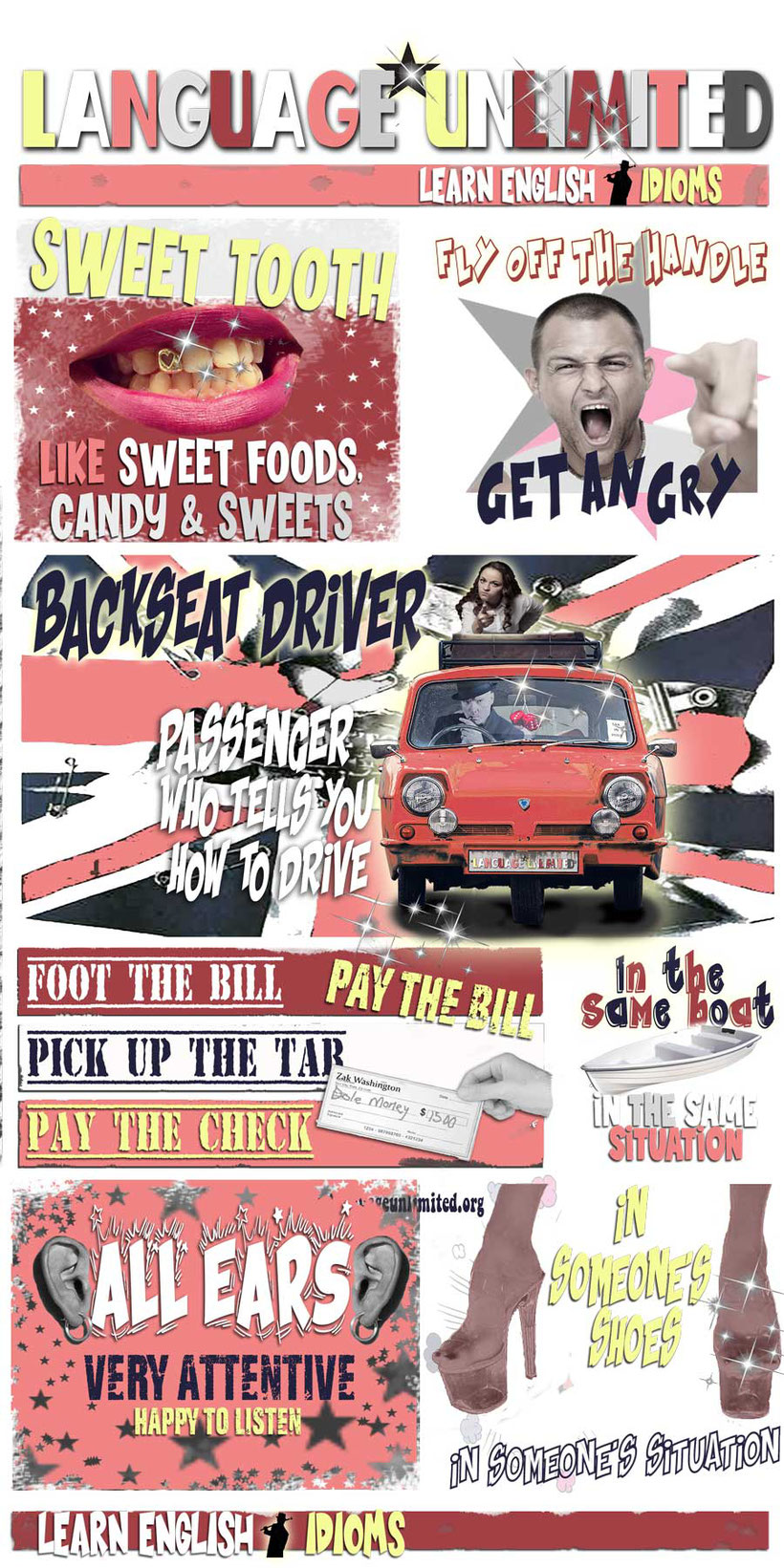
(Later in the pub)
Well done! You didn’t get the job. Let’s celebrate and relax a little.
Make up (IT: inventare SP: inventar) some second conditional sentences.
USE: We use second conditional for impossible or improbable situations.
For example:
THE SITUATION: YOU ARE NOT JAMES BOND. YOU DO NOT HAVE A LICENCE TO KILL.
EXAMPLES: If I was James Bond, I would drive an Aston Martin.
If I was James Bond, I would live in Monte Carlo.
If I had a licence to kill, I would kill my neighbour.
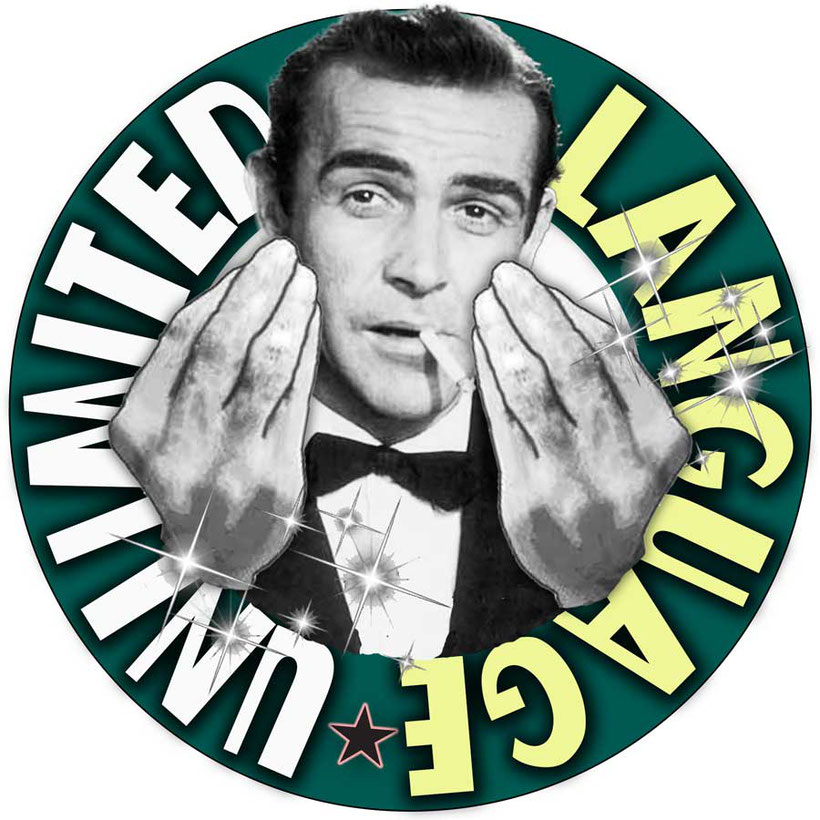

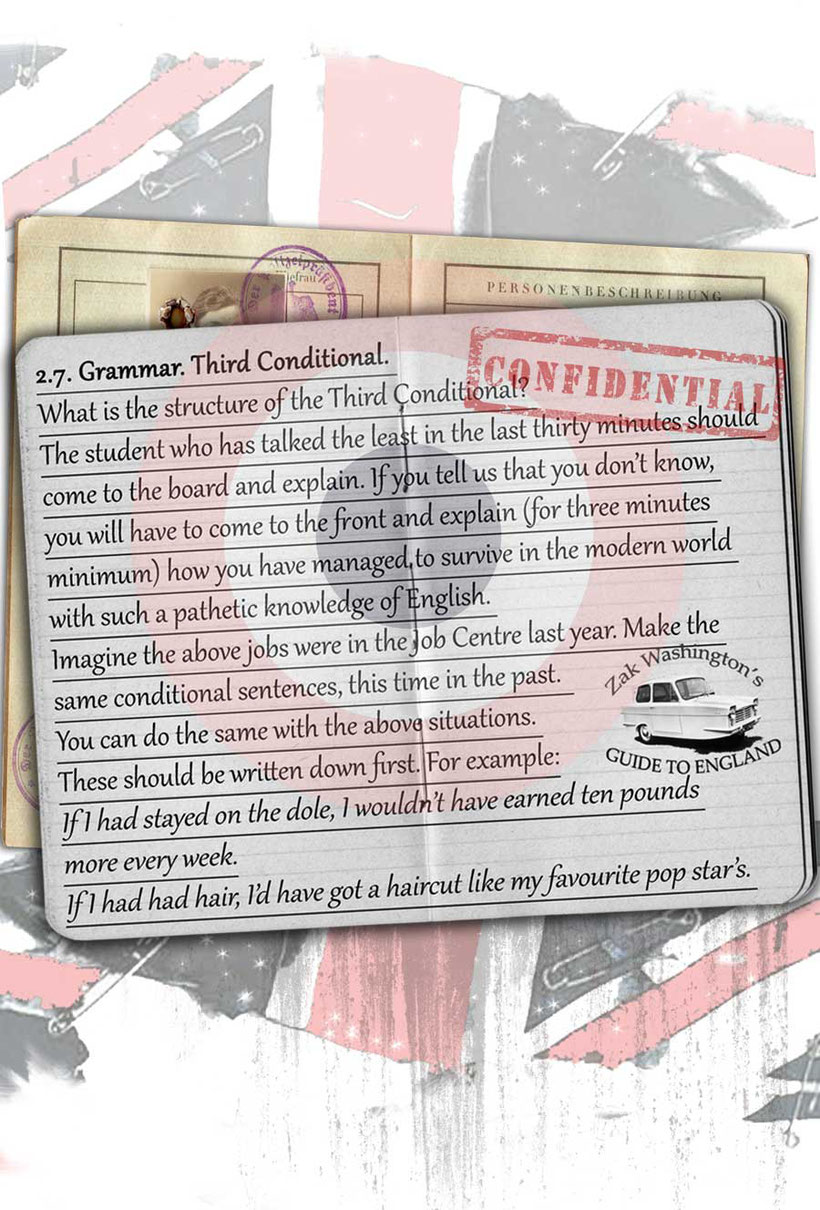
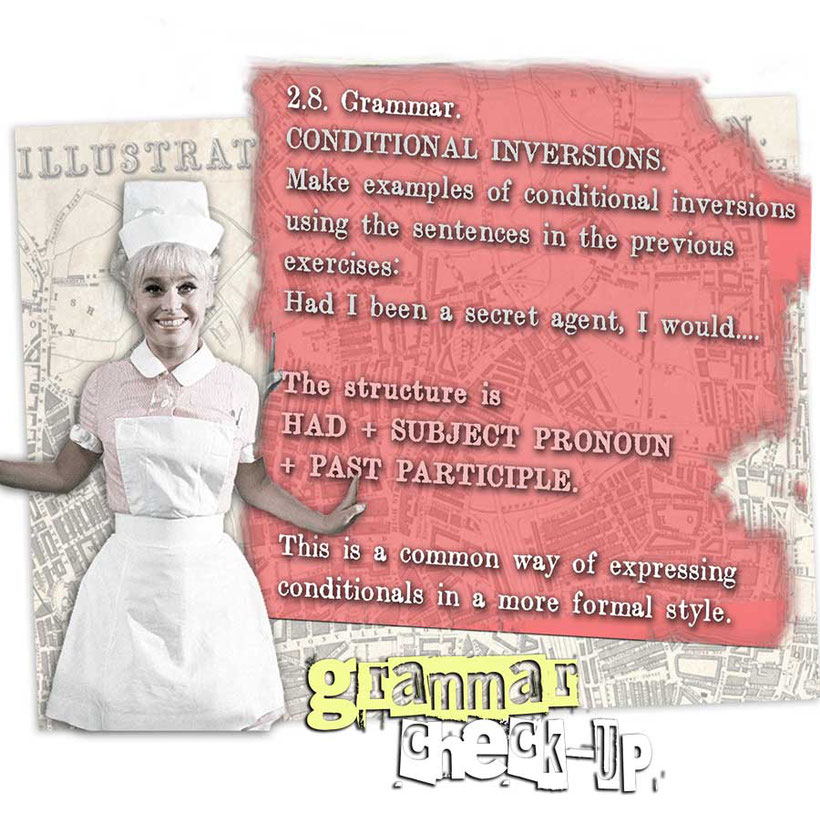

You are still in the pub. There is a very attractive student who you like. This student always gets really excited about people who know their phrasal verbs. To make a good impression explain what happens in the following story. Find an alternative verb for each that has the same meaning.
It wasn’t really the type of work that I was cut out for, but I took the job anyway. My job was to cut off the ends of pieces of plastic. Later, the factory cut back the staff, and I found myself cut off without a penny. I signed on the dole. They soon cut my dole, so I had to cut down on luxuries. I cut out all the things that I didn’t really need, but one night in a moment of depression I cut up my dole card, after that they wouldn’t let me sign on and cut my dole off.

Now change the following verbs so that they include the word ‘CUT’.
She was devastated when her husband left her to go out with a teenage ‘bimbo’.
She took out one of his photos and chopped it into small pieces.
She promised to get a new image and reduced the number of jam doughnuts (SP: donut IT: ciambelle) that she ate to six a day.
Her family decided to stop payments to her when they found out that she was gambling.
As an act of rebellion against them she shaved completely (SP: rapar IT: rasare) her head.
I don’t really know if she has the right personality to be independent.

SPEAKING PRACTICE SOCIAL ENGLISH PHRASES

The game: Dave is a hooligan (SP: gamberro IT: teppista) who lives in London. He is a criminal who doesn’t work. Instead of working, he walks the London streets looking for gullible (SP: crédula IT: ingenua) victims, to rob them.
The people he likes to rob the most are rich tourists. The problem is that in London it is very difficult to tell who is a tourist and who is not, as there is such a cosmopolitan population.
The only way that he can distinguish between an English person and a tourist is by speaking to them in English. Dave the hooligan walks around the London borough (SP: distrito IT: quartiere) of Squatney, and whenever he meets someone that he thinks is a tourist he greets them or asks them a question, or says a phrase, which needs the correct response.
You will be the tourist! You must respond to Dave's phrase. ‘Yes’ and ‘no’ answers are unacceptable. You must try to use the standard phrase that is most acceptable.
If you answer incorrectly:
The 1st time he lets you go.
The 2nd time he steals (SP: robar IT: rubare) your watch.
The 3rd time he steals your phone.
The 4th time he steals your jewellery.
The 5th time he steals your watch.
The 6th time he steals your money.
The 7th time he kills you.
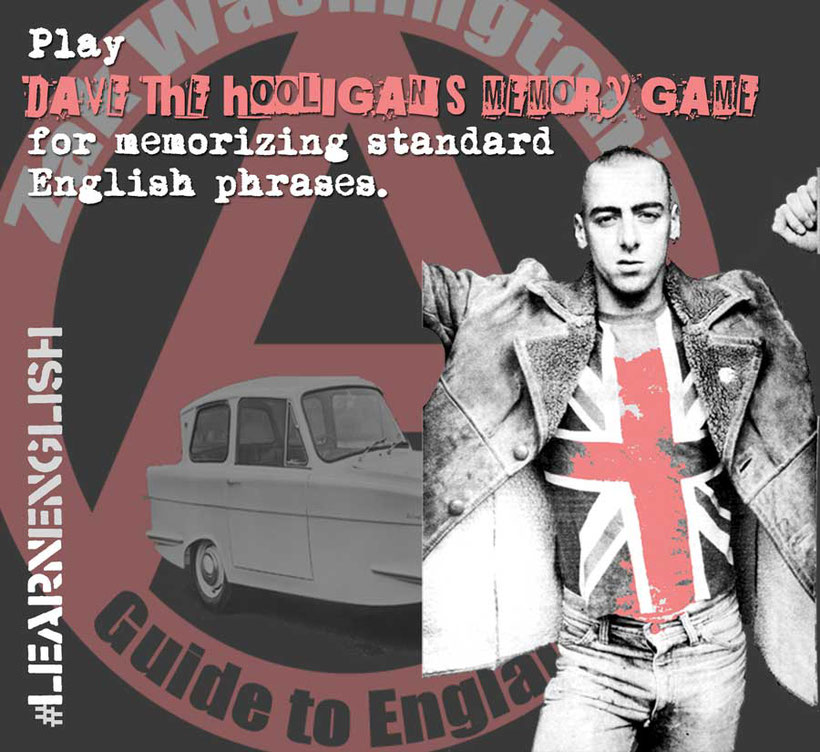
SOCIAL ENGLISH GAME HOW TO PLAY
Divide into groups of four students. Student A, B, C and D. Choose a column below.
You each have:
1. A watch.
2. A pair of underpants.
3. A phone
4. An item of jewellery.
5. A wallet
When the items are stolen from you cross them off the list.
There are four question cards. (You can play in groups of three, or even in pairs.)
Each student has one question card. You will ask the student on your right the questions. First Student A ask B the first four question at the top of the list. If Student B gets the answers wrong, tell him/her the correct answer. Now Student B asks C, and then C asks D, and then D asks A.
We are back to the beginning. Now the whole process is repeated. But this time you ask questions 2-5 at the top of the list. This continues around the square. You have a three second time limit to answer any of the questions that have already been asked.
So, in each round you need to memorise more and more answers. Each time you make a mistake. Cross the item off the list.
You are only allowed a maximum of six mistakes in each round before you are ‘killed’ and eliminated from the game.
The punishment will be that you have to copy the lines from your question card until the game finishes. The other students continue until everybody is ‘killed’. The winner is ... the last student to be eliminated.
Now repeat the rules back to your teacher in your own words, to make sure that you have understood them.
Tip: Don't give your underwear away immediately.
Choose a column!
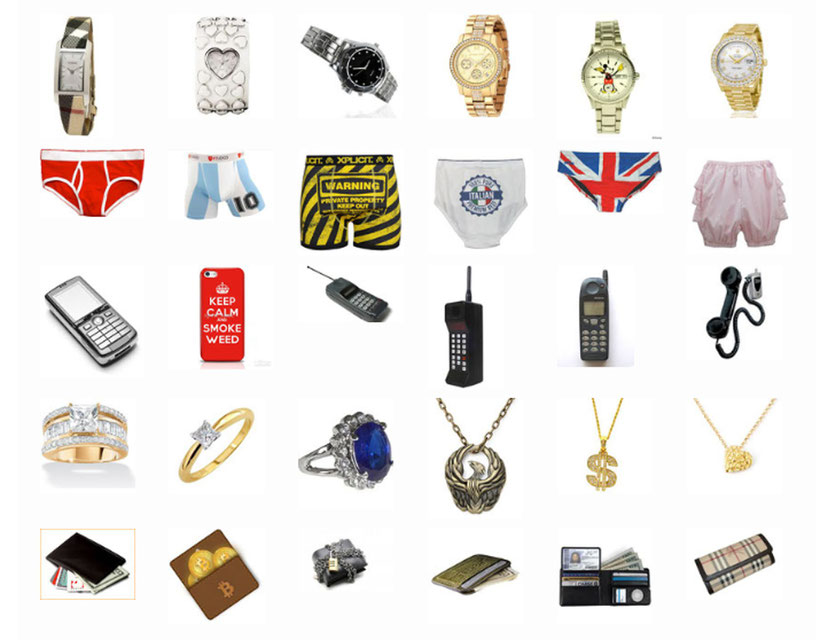
ENGLISH LANGUAGE TYPICAL PHRASES GAME Print and cut up the game cards below!
Team A’s questions and possible answers.
How are you? Fine/Very well thanks/OK/Not bad Unacceptable: Very fine./Good(unless you are American)
Thank you. You’re welcome/It’s nothing./Not at all.
How do you do? How do you do?/Pleased to meet you./Nice to meet you.
Where do you come from? I’m from .....(country). Unacceptable: I come from my house.
I’ve just got married. Congratulations! Unacceptable: Me too! Oh, really! Etc.
Have you got a light? Here you are./Sorry, I don’t smoke.
Have a nice day! Same to you. / You too. Unacceptable: Same with you.
How long have you been living in this country? I have been living here for.... Unacceptable: I’ve been living here since.../I’m here for.../I have ...years living here.
Do you mind if I join you? Please do./ Of course not./Feel free./You are more than welcome./Sure./Go ahead./By all means.
Help yourself to a drink. That’s very kind of you./Thank you very much.
Team B’s questions and possible answers.
How’s it going? Fine/Very well thanks/OK/Not bad Unacceptable: Very fine./Good(unless you are American)
Pleased to meet you! Pleased to meet you too./How do you do?/Nice to meet you too.
Do you mind if I smoke? Not at all. /Feel free./By all means./Go ahead.
What have you been doing? I’ve been ......(verb in gerund).
I hope you have a good weekend. Same to you./Likewise./You too. Unacceptable: Same again.(In bars only)
I hope your sister gets the job. I hope so too.
When you see Peter say ‘hello’ from me. Yes, I will./ I shall do that.
What is your sister like? She’s tall/nice/kind/beautiful /ugly etc. Unacceptable: She likes .......
Do you need any help with that bag? That’s very kind of you. No. I can manage. /No. That won't be necessary.
Let me pay for a taxi home for you. That’s very kind of you./How kind./How nice./That won’t be necessary.
My great grandfather passed away this morning. I’m very sorry to hear it./May I offer you my condolences. Unacceptable: Sorry!
Team C’s questions and possible answers.
How’s the wife? She’s very well. / OK/Not bad./Could be worse. Unacceptable: ’m not married.
How’s it going? Fine/Very well thanks/OK/Not bad Unacceptable: Very fine./Good(unless you are American)
What are you called? I’m called ....(name)./My name is......
Can I have one of your cigarettes? Certainly./By all means./Help yourself./Go ahead.
Sorry I’ve spilt your drink. It doesn’t matter./Don’t worry about it./It couldn’t be helped./It’s not a problem.
I’ve passed my driving test. Well done./Congratulations. Unacceptable: Oh, really?/Whoopee/Who cares?
Can I take this seat? You are more than welcome./Sure./Go ahead./By all means. /Please do./Of course not./Feel free.
Would you mind helping me? Of course not.
Why don’t you come to my party at the weekend? I’d be glad to./ I’d love to./I’m afraid I’m busy.
Could I see a photo of your wife naked? Certainly not!/Absolutely not!/No, you may not! Unacceptable: Yes.
(Say this very quietly so the other teams cannot hear.)
Psssst pss mumble mumble murmur. I beg your pardon./Could you speak up please?/Sorry, I didn’t catch that./Could you repeat that?
Team D’s questions and possible answers.
What’s your name? My name is...
How have you been? Fine/Very well thanks/OK/Not bad Unacceptable: Very fine./Good(unless you are American)
I’m glad you could come. Thanks for inviting me.
Great to see you again. Likewise./Great to see you too.
My brother was robbed yesterday. How awful. /You don’t say./You’re joking!/Oh, that’s terrible.
Did you have problems finding the place? None at all./Not really./It was easy./Yes, it was difficult/tricky.
My wife is pregnant. Congratulations./I’m very happy for you.
I’m off ! See you later./Goodbye./Catch you later.
I don’t like hooligans. Me neither.
I’m feeling depressed today. Cheer up./I’m sorry to hear that./You’ll get over it. Unacceptable: Me too.
It’s my birthday. Many happy returns of the day./ Happy birthday. Unacceptable: Happy birthday to you!(That’s the song.)

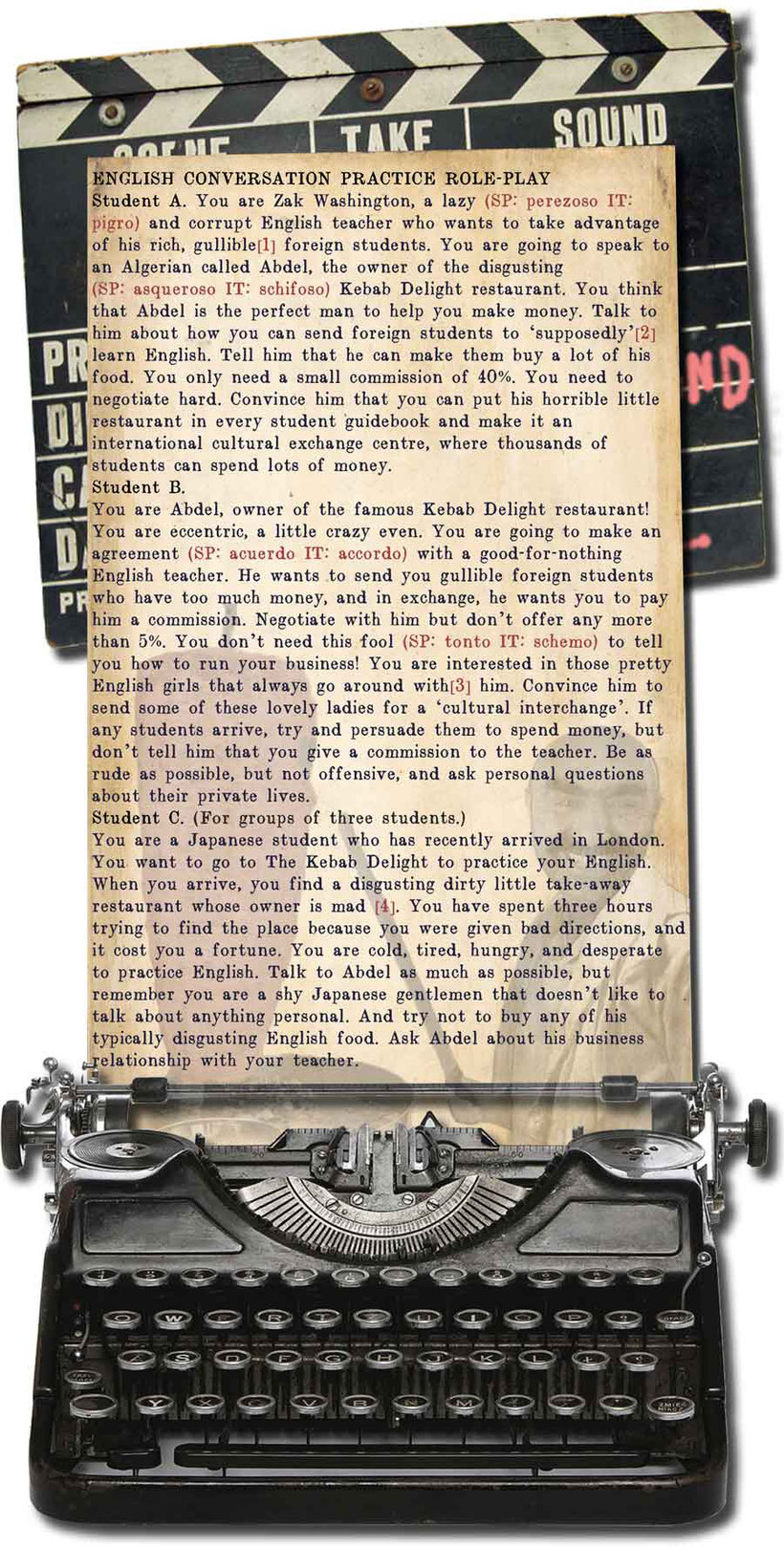
GLOSSARY AND USAGE
[1] Gullible (adj.) (SP: crédulo IT: ingenuo) ready to believe anything.
[2] Supposedly (adverb) this is a word that is commonly confused in English with supposed to. It means that something is expected to be, or is believed to be a certain way. ‘It’s supposedly a really nice clean restaurant with a lovely owner’, would mean that someone had recommended the place to you, and that it should be like their description. The confusion is caused because there is another similar structure, supposed to which can have a different meaning. ‘It’s supposed to be a nice clean restaurant…’ has almost the same meaning as the above expression. But there are times when this is more common to talk about obligation. ‘You are supposed to keep your restaurant clean’, is what a government health inspector would say when he finds a dirty, unhygienic restaurant. He means that it is the normal thing that you should or must do, and is therefore a recommendation, and quite different from the first example. Compare also, ‘He is supposedly studying, but is thinking about that girl that he likes’. (People think that he is studying) and ‘We are supposed to study from 9.30 to 12.30, but everybody usually arrives late.’ (It is the school rule that classes are at these times.)
[3] (to) Go around/round with (SP: andar con IT: passare il tempo con) a phrasal verb that means to be friends with, and to spend time with people. ‘She’s started going round with a bad group of people, I wish she would find some nice friends.’ To hang out with is a common, informal way of saying the same thing. ‘I love hanging out with them. We always have a good laugh.’
[4] Mad (adj.) students prefer to use the word crazy to describe mental instability, but you should understand that mad is probably a more common way of expressing the same idea. A lunatic could be called a madman, but it is improbable that a native speaker would say a ‘crazy-man’. (British slang: nutter, loony.) The noun is thus madness and the adverb.













